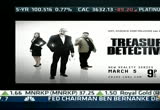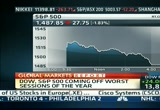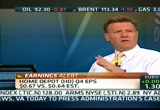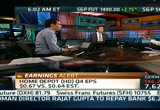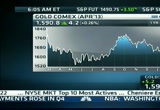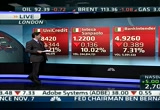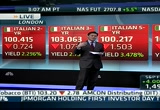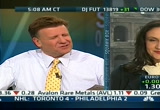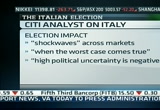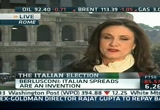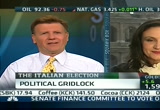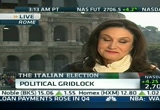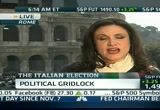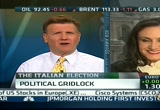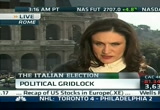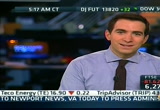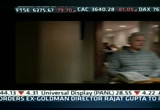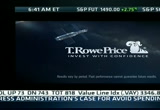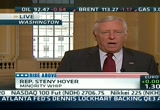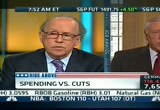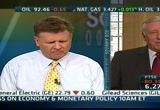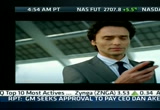tv Squawk Box CNBC February 26, 2013 6:00am-9:00am EST
6:01 am
good morning. the day's top stories, the global markets. political paralysis, the point of that in italy spooking investors and lead to go a sell-off on wall street. and then asia follows suit overnight. european stocks are tumbling on upper trading this morning. it is tuesday, february 26th, 2013 and "squawk box" begins right now. good morning and welcome to "squawk box" here on cnbc where thirchx feel a little under pressure. i'm andrew ross sorkin along with joe kernen and becky quick. well, becky quick is off today. she will be back tomorrow. global markets focusing on italy this morning. sylvia berlusconi's center left rivals won parliament's left house, but failed to win an absolute majority in the upper house. this is creating uncertainty. berlusconi has ruled out an alliance with former italian prime minister mario monti.
6:02 am
he's arguing the results reflect unpopular discontent with stocks. we saw sharp drops, italian yields jumping. check out early stocks in european trading. this morning, we have red stocks across the board. germany, close to 2% off and france over 2% and the ftse down materially. u.s. stocks to drop yesterday's session on that uncertainty in europe. stocks steadily declined throughout the day. and accelerated losses during the final hour. the dow and the s&p tuning in their worst days of the year. major asian markets also trading lower. exporters exposure to europe, they were hit particularly hard, as you'd expect. and u.s. equity futures at this hour, we have green arrows and things might turn themselves around today. fed chairman ben bernanke is going to be heading to capitol hill this morning for day one of his hemp free hawkins testimony.
6:03 am
he's expected to defend the central bank's bond buying and likely one that automatic spending cuts pose risk. cnbc is going to have complete coverage all day. and our guest host this hour is ready to tackle all of these issues. >> this yesterday was -- thanks. we saw yesterday and you know he's not becky. you did say here with becky. he was sitting right there. he looks nothing like her. >> every morning when you say the same thing -- >> i know. andrew and cliff. but before we get to home depot and is home depot is out and we're going to do this as quickly as possible. but there will be political maneuvering on what happened yesterday in the markets based on the sequester the.and because people don't watch it as closely as us, they're going to see the sequester is now starting to come to the floor and they're not going to tie it to italy because it's hard to connect the dots to italy. but we were up like 80 points
6:04 am
and people knew full well that there was no talk between the parties in washington and it wasn't until this happened in italy, which shows you that once again the idea that europe and 2013 was going to be a back burner issue, that's not -- we knew it wasn't really the case. this supposedly is a vote to not go down the paths of austerity and just getting their labor structure more akid to free markets, etcetera. i just wanted to get that out. steny is going to be on. and i love steny. >> but you think this is going to become a talking point. >> i think this will be a talking point for people who say we can't handle the sequester. >> that italy thing -- >> on the sequester. >> stock futures up today.
6:05 am
>> home depot is reporting 68 cents a share, ahead of expectations and revenue is up 18.2 billion versus 17.7 billion. that's pretty big, a $17 billion share repurchase authorzation. i don't know the time frame on that, but compared to what the market cap of home depot is, that's still a pretty significant number, $95 billion market cap. the stock, unclear where it's going to open, 63.50 to 65.87 on that chart. you can see it's down, lowe's ended down 5% yesterday, andrew. >> but remember how that was -- >> but that was 200 points, up, down, up, down. that was more, i think, more market related. don't you think? >> so we blame italy? can we blame italy on lowe's? >> well, we can blame the overall market being down 200 points. ge was down significantly
6:06 am
yesterday. it had been up earlier. the dividend at home depot, in addition to that $700 billion repurchase, the dividend was raised by 34%. it's a 1.8% yielder now. so add another third on to that, it gets up into the close twos. u.s. same-store sales, do you see that number in the u.s.? home depot, up 7.1%. this might be somewhat sandy related. that's what people are looking tore. >> but there's also a 53-week -- is it this a 53-week year? >> it is. >> but you're going to get a bump on the extra week, as well. >> in this past quarter or this year? >> no, no, for last year. >> maybe it did, then. same-store sales up 3% in the fiscal year for this year. let's check on the broader markets this morning.
6:07 am
the ten-year is -- you can see home depot which is now indicated down 1.66. we're at 1.87% and that is not surprising that we're starting to see a slight slide back into u.s. assets. and i know that the euro got killed against the yen and other currencies. you can see 1.30 this morning. euro versus the dollar. gold has been in and extended down trend. you know, not really seeing a big rush to -- when there's uncertainty, you think maybe gold is going to go up. it's up a little bit, 1590. and i don't know what oil should do. we're down about 81 cents now at 92.30. >> okay. let's go see our friends overseas to find out what's going on with the market out of europe. ross westgate is standing by in lobbed for the report. ross. >> hey, andrew. >> i see red there. that's not -- >> a sea of red.
6:08 am
only about 40 stocks out of 600 at the moment on the dow jones stoxx 600 have green on them. you see the top line above me here. so some serious lows. first thing this morning, number of italian banks limit down, as well. let's show you where we stand. the ftse 100 the best performer. the cac 40 down 2%. the xetra dax down 1.8%. we saw the ibex in spain down off 3%. here is the italian market. ftse mid down 4.6%. i talked about those italian banks. the biggest players are seeing the biggest losses. unicredit down 8.2%, as well. back into the 7.3%. and as you might see, expect a sharp spike higher in italian yields. now, the ten-year yesterday we were trending about 4.24%. we're currently trading at 4.74%. we did get up to 4.86%. we had a six-month t-bill auction this morning, yields
6:09 am
sharply higher than that in january. we picked 50 basis points higher today, 1.23%. bid to cover was down, as well. and it's going to be important because tomorrow we've got us a fresh ten-year auction for italy and suggestions are that the price will be sharply higher. we'll see how demand is. it's going to gear a fresh test for the italy post this italian gridlock projection. whatever happens in the election, at least some political stability and this was the worst case scenario. and now, it's questioning the whole reform program in italy, as well. remember, the omt program, which has done so much to support these italian markets and italian yield curves is predicated on having a government in place and can deliver the reform for the ecb.
6:10 am
in the back of traders minds is whether we're putting in a disconnect before that. euro/dollar got hit, as well. not quite there at the moment on euro/dollar. 1.3095. a little above it as you can see. but nevertheless, european assets getting walked at the moment. that's where we stand. back to you. >> ross westgate, thank you. let's get to michelle caruso cabrera from rome. get the u.s. copy elections italian style. it's hilarious. i love the comedian who got twice as many votes@as monti. monti wanted austerity. we don't like it here, either. then berlusconi, 76 years old, they're saying it's not necessarily that he's alive.
6:11 am
it's maybe he's undead. they have a great piece with a lot of key points, but thank god we sent you over there, even though, you know, you like going over there, anyway, but it's nice that you're there for this, michelle. what can you tell us? >> yeah. what we have this morning is complete and total gridlock, stalemate, there was 130e6d to away clear outcome from this election. there were numerous reports out this morning highlighting what happened here. let me give you one example of what citi wrote, for example. shock waves across the market. this is what happens when the worst case comes through. high political uncertainty is negative for investments in italy. so this is quite bad. remember, this is a parliamentary system. so even though someone yesterday got the most votes, they didn't win. that is luigi bersani. berlusconi and grillo got a lot
6:12 am
more votes than anyone expected. that's what led to gridlock and so no one is in control. silvio berlusconi, sounding exhausted, called into one of his networks this morning to chat with the news anchors there. first of all, he doesn't think there should be new elections, which is a possibility. when he was asked about interest rates rising in italy, he said, don't worry about interest rates. they are an invention. the markets are a little bit independent and a little bit crazy. and the fact that the spread is widening compared to german interest rates, why do we have to compare ourselves to the germans all the time? we don't have to. he hinted to a coalition with the left. he didn't say he would do it.
6:13 am
the other thing he said was he was hoping that mario monti didn't even get 10%, didn't get into parliament at all. he said if that had happened, he would have gotten drunk, but he's decided to give away those bottles of wine to his friends. beppe grillo, the comedian that you talked about did phenomenally well. he boasted about the fact that they did this without money and without reimbursements for their costs. remember, if you have a political party in italy, the taxpayer reimburses you your campaign costs. there are only two parties in this election that refuse to accept the money. the comedian grillo and then this very small pro market party that unfortunately did not do very well. why do we care? remember, italy is the third most indebted country in the world. they owe the world 2 trillion euros.
6:14 am
they stopped growing in the mid '90s. their revenues are going down and costs are going up. they must change that or at some point they can't pay anybody back. we've seen that movie before. back to you guys. >> 128, 126% debt to gdp. 10% unemployment. >> yep. >> unemployment among the young, 36%. four straight quarters of recession. i wanted to point that out to you about the young. a lot of those young men, you know, they're living at home, michelle, which makes it tough over there. i don't know whether you -- >> but didn't that do that when the economy was good? >> yeah. but i'm just talking about for your situation. because anyone that you meet, you just have to make -- i don't know. some kind of alternative that -- i don't know. anyway, i don't know what to think of italy at this -- why are you laughing?
6:15 am
never mind. staying in a nice hotel. go ahead, andrew. >> you know, can i tell you, i -- >> go ahead, michelle. >> on twitter a lot of the people are saying oh, the italians are crazy, the italians are this. i don't think the italians are that crazy. i think they're angry that germany is telling them what to do. they don't like that. they see that as an invasion of their sovereignty. mario monti was not elected. what's happening here is theoretically undemocratic. they're not completely crazy at this point. >> michelle, walk us through what happens next. that's the part i'm still unclear about and i think it's part of the reason why the markets are as uncertain as they are. >> so you ask numerous people. we hired a student who is get ago ph.d. in political economy who explain the election process here. what happens next? will there be another election?
6:16 am
italians are quite physical. they do this. they don't know. there are a myriad of possibilities. somehow miraculously there could be a government formed because parties that hate each other decide they're going to work together. will an election happen in a month or six months? the establishment wants to delay elections because they think if there were new ones immediately, the comedian would do even better and perhaps win the whole thing outright. so they don't want that to happen. so it is impossible to know at this point. that's why you're getting the reactions in the market. it's so frustrating for italians. there's a call to change the legislation around elections so that this doesn't happen again. because they just can't stand the uncertainty, either. >> so who is in charge, though, of figuring out what happens next? >> so all the people who got elected last night go into parliament now. and in theory, bersani, the guy who got the most votes, can try to form a government. one possibilities that's been
6:17 am
talked about is the one thing that the vast majority of those elected who agree so is changing the laws around election. we may get parliament to go in. they may do something related to, you know, the election process, and then we start all over again. but the people who got elected last night in theory are in charge, but also in theory, they couldn't pass anything of meaningful reforms. >> i will bet you that you can walk around over there, you're in a beautiful place right now, but you're not going to be able to tell there's a whole lot going on there. >> you're right. >> it wloox like a beautiful day. italy, how bad can it be? you're in italy. >> let me ask one other question. >> and the pasta is always phenomenal. >> exactly. >> anything outstanding in italy, not outstanding in the -- of course, the food is outstanding. is there any budgetary issues
6:18 am
that need to be dealt with in, say, the next three months? >> so what we have to watch for is their debt calendar, right? we're going back to the days whenever italy needs to borrow money, how much did it cost compared to the last time? both italy and spain front loaded as much as they could at the beginning of the year. they were debt rollovers. they knew they had to redo their debt at a certain amount for the year. so they did as much as possible, as they could early on to get very low interest rates. and remember, this country has a primary budget surplus. they can live with higher interest rates for much longer than greece did, for example, which never slipped on to a primary budget surplus. >> and the rising -- >> so we're going to start watching their debt calendar. >> they were at low rates earlier this week, like historical lows, right? so theorizing from low rates, right? >> yeah, exactly. exactly. >> 36% unemployment.
6:19 am
ming the young. >> remember, it's 50% plus in greece and spain. >> the uk is not good. >> the two tier system, particularly in italy. >> michelle caruso cabrera, thank you. smart moving sending our chief international correspondent over there. >> management here and her over there. still to come this morning, searching for opportunities amid this week's global market sell-off. two investment ideas from our guest host and then in the next half hour, we've got "squawk box" newsmaker former treasury secretary larry summers is going to join us. find out what he makes of the situation in europe and the looming sequester here at home. but first, as we head to a break, check out u.s. engt futures. stay tuned. ♪ [ male announcer ] it was designed to escape the ordinary.
6:22 am
welcome back to u.s. equity futures right now. we're going to get back maybe a quarter of some ovs losses we saw yesterday if it were to open there. it's about 58 points on the dow. it won't get us back to 14,000, but it's a start. european stocks this morning down in this from 1.25% to 2.14%. in france and that is the story. what happened in italy, which we'll be talking about all morning long along with the sequester. making headlines, more americans fell behind on their auto loan
6:23 am
payments in the last three months of 2012. transunion, the credit reporting company says the rate of auto rate payments at least 60 days overdue climbed to 0.4% in the quarter. that remains, though, at the lowest level since transunion began keeping records way back in 1999. >> let's get to the national forecast alex wallace. >> good morning to you, guys. it's snow, snow, more snow. some of the same areas that were impacted last week dealing with it now across the plain states and the midwest. wichita, still snow there for you. in fact, you've picked up about 7 inches and we're still dealing with the snow. more to do with it as we work our way across missouri. and up around chicago. we'll eventually start off as a bit of rain. here is today's forecast. snow across the plains in the midwest. working on off towards the northeast as we head on into tomorrow. we'll continue to deal with it around chicago, moving into lower michigan. so detroit, you'll have to deal with some of that snowy weather
6:24 am
and eventually the northeast, again, will have to deal with that threat for the wintry precip, including a good chunk of new england by the time we get into thursday. how much are we talking about? this goes through thursday in the morning hours, generally 3 to 6 inches in that blue-shaded areas. but there will be some pockets of 6 to 12 inches. again, shovelble snow to deal with here. by thursday morning, into the northeast, good news for the ski resorts. but boy, oh, boy, it will be tough to get there with a foot to a foot and a half across parts of new york state. then there's the wet side of things. very heavy rainfall to deal with across parts of georgia, into north florida. we've been tracking strong storms. the area in the red watching for some severe weather. guys, back to you. >> thank you, alex. our guest host this morning has managed its -- you manage 30 billion? >> not by yourself. >> i'm the top of the pyramid. >> 30 billion in fixed income
6:25 am
investments. bill cutwater. thank you for being here. we have a couple of things to talk about. we talk about italy. do you care? is the market getting rattled nor the right reasons, for the wrong reasons? >> i think for the right reasons. what's pushing policyholders forward is market volatility. and when draghi came out, to remember back a few months and instead, we'll do whatever it takes and created the omt. we've got a very, very calm market and too calm in my opinion. so i think in a per verse way, maybe a flash of volatility. putting pressure on markets might move that volatility forward. so we do care. it's creating volt tilt. >> is volatility opportunity in your world? >> i think if you have a 12-month horizon, we like to take a long view. >> are you talking stocks or bonds right now? >> mostly bonds. >> i need to know because you said the markets got too calm
6:26 am
and there was a lot of volatility. you're talking about bond markets. >> yeah. i think the bond market is coming down through time. we chopped a huge amount of tail risk. we may debate, is this the end of the euro? i don't think it is. i think people are a lot calmer. i think you're seeing that at least in the united states stock market. it's pretty calm. bond spreads haven't moved all that much right now. and so it's something to watch, for sure. i think if we get a real flare-up, spreads widening dramatically and rates in italy moving north of 5%, we'll take a look at the assets and say, gee, there may be some opportunities here. if we look forward 12 months, we're pretty constructive on the growth of the world in general. >> contractive. when did this come? >> instruction. >> people -- >> good word. >> i'm constructive on the market. what does that even mean? >> cautiously optimistic. >> replaced that. but so just reading through
6:27 am
lines the credit markets had been an issue. in the last year, you've seen a lot of healing and it got to the point where you thought other markets could do better and you still feel that's the case? >> yeah, i think that's the case. if you look at the performance of the bond market, it's almost like the dogs have adachted. those sectors of the market that had been unduly beaten up, number one performers last year, 16% return, high yield, bank of finance the, bond paper 12%, 13%. these are equity-like returns. i think we're not going to see that, however, this year. >> the high yield market backed up a little. but rates backed up briefly and prices went down. but now they're oxygen, right? they're not portending any -- >> no. >> there's no signals there, there's no caution flags there right now. >> right now, there's no signals. predictably, they leaked out a little bit. high y50e8dz bonds are still
6:28 am
outperforming year-to-date. closed the day yesterday, 1.5% unannualized. and i think there's another divergence we need to watch this year in the bond market. the bond market is a few markets. the interest rate market is driven by treasuries. talked a lot about that one. and the spread markets, the risk markets. it's a tale of two cities and how you think about that in 2013. i think you'll have some opportunity to soften that blow depending on what you're investing in in the bond markets. >> coming up, uncertainty in europe and a looming sequester in the u.s. ben bernanke prepares to testify on capitol hill this morning. it looks like you're getting ready to -- >> right. >> no. this morning's top stories and the market reaction, next. platform from charles schwab... tdd#: 1-800-345-2550 gives me tools that help me find opportunities more easily. tdd#: 1-800-345-2550 i can even access it from the cloud and trade on any computer. tdd#: 1-800-345-2550 and with schwab mobile, tdd#: 1-800-345-2550 i can focus on trading anyplace, anytime.
6:29 am
tdd#: 1-800-345-2550 until i choose to focus on something else. tdd#: 1-800-345-2550 all this with no trade minimums. tdd#: 1-800-345-2550 and only $8.95 a trade. tdd#: 1-800-345-2550 open an account with a $50,000 deposit, tdd#: 1-800-345-2550 and get 6 months commission-free trades. tdd#: 1-800-345-2550 call 1-800-836-8799. transit fares! as in the 37 billion transit fares we help collect each year. no? oh, right. you're thinking of the 1.6 million daily customer care interactions xerox handles. or the 900 million health insurance claims we process. so, it's no surprise to you that companies depend on today's xerox for services that simplify how work gets done. which is...pretty much what we've always stood for. with xerox, you're ready for real business. otherworldly things. but there are some things i've never seen before. this ge jet engine can understand 5,000 data samples per second. which is good for business. because planes use less fuel, spend less time on the ground and more time in the air.
6:30 am
suddenly, faraway places don't seem so...far away. ♪ suddenly, faraway places don't seem so...far away. for tapping into a wealth of experience. for access to one of the top wealth management firms in the country. for a team of financial professionals who provide customized solutions. for all of your wealth management and retirement goals, discover how pnc wealth management can help you achieve. visit pnc.com/wealthsolutions to find out more. how do you keep an older car running like new?
6:31 am
you ask a ford customer. when they tell you that you need your oil changed you got to bring it in. if your tires need to be rotated, you have to get that done as well. jackie, tell me why somebody should bring they're car here to the ford dealership for service instead of any one of those other places out there. they are going to take care of my car because this is where it came from. price is right no problem, they make you feel like you're a family. get a synthetic blend oil change, tire rotation and much more, $29.95 after $10.00 rebate. if you take care of your car your car will take care of you.
6:32 am
good morning and welcome back to "squawk box" here on cnbc. i'm joe kernen along with andrew ross sorkin. becky quick is off today. our guest host this hour is cliff horso, cut water asset management who manages $30 billion. >> $30 billion. >> if you could just skim a little, no one would know. how much do you have on you? >> how about that. >> how much do you have on you? >> i think i've got a buck or so. >> it's a nice suit. the people that give him 30 billion to manage don't want to see him -- >> exactly. >> our top story, the global markets and european uncertainty in italy -- i'm just happy this
6:33 am
dude is back. sylvia berlusconi, center left rivals won parliament's lower house, but they failed to win an absolute majority in the upper house. he argues the election results reflect popular dealership discontent with the austerity measures and that's the problem because the country has to institute certain things to make good on its promises. which allowed it to borrow money. italian banking stocks were halted limit down initially. once they opened, there were some sharp drops, italian yields jumped and european stocks in early trading are lower, but orderly. >> i would say it's the worst you see is 2.25%. over in asia, you can see that the yen went up sharply against the euro as a result. you're seeing 2.25% pullback in the nikkei and some spread numbers on the other asian
6:34 am
markets, as well. exporters with the exposure to europe will be hit particularly hard, as you could expect. and u.s. stocks sold off yesterday. we were up about 80 points initially and we closed down 2 hup. it's almost a 300-point swing, but we're indicated to go back about 52 points. the other story to watch, fed chairman ben bernanke is going to head to capitol hill this morning for day one of his humphrey hawkins testimony. this comes around a lot and it's only twice a year. we constantly are saying -- >> it feels like it. >> a lot which shows you how quickly we're aging. >> what do you think it's going to say? >> the same-old same old. >> even after the minutes? last week after we were all in a panic last week? >> you can't figure out what a guy anticipates m.o. is. >> i know his m.o. >> we just call helicopters in for a reason. he has not disappointed. and maybe we've needed it. a lot of people would say otherwise you look at how japan did everything.
6:35 am
i'm just saying that after last week's mini sell-off, after the minutes, everybody had a minor freak out. >> he's not the guy that said maybe we're worried. >> no, none of them. >> it's some of the other more hawkish guys. >> he can accompany that. >> i'm going to tell you what he's expected to do. can it you? he's expected to -- >> wow. >> he's expected to defend the central bank's bond buying. he's like to warn that automatic spending cuts pose risks. >> month. >> yes. >> he's going to say that? >> yes. who is going to have complete coverage all day? >> a network that starts with a "c." >> it does. starts with a "c" and ends with a "c." we're going to have complete coverage all day long, obviously. joining us now, paul schatz. chris corso continues with us. paul, do we need to pay attention to what the chairman says today? i could probably write it right here about the see zequester an about qe and interest rates,
6:36 am
right? >> joe, i think you did a good job. let's go home for the day. see you tomorrow. >> that's what i mean. >> there's no question bernanke is not going to -- we're not going to surprise the markets. if you go back in the last five years, they have quantitative ease, then disavowed it. then they've quantitatively eased and disavowed it. they pull in the reigns quickly. this is scripted. this is not something new. you may have more hawks on the fed now than four and five years ago. this is a coordinated effort within the fed so we don't have economic conditions cranked up. he's a maestro, actually. >> where are you on the sequester, paul? >> i think most of these government things are predicted in advance. i think if we sell off in a see zester, i think it's a buy on the news. if we rally, which i don't think we will, you can probably sell it.
6:37 am
i can the italy thing is a footnote for a day or two. i think sequester is a footnote for maybe at max a week. but, again, i don't think this is a big deal. we all know it's going to get resolved. boehner is going to stomp his feet. the president is going to stomp his feet. in the end, we know they're going to have these spending cuts. they always go down to the last hour and make a settlement. whether it's today, tomorrow, the weekend, they're going to settle it. then we're going to move forward and look behind us and say, what's next on the list? >> i would think some day if we keep settles things like this with a $1 trillion deficit that that could be taken negatively. >> and, joe, how long have you been saying it for? a trillion there and a trillion there? eventually, it becomes a large amount of money. we're there. listen, at some point sooner than later, the bond vigilantes are going to come pout. i don't know if it's in 2014 or '15 or '16, but remember how quick it took in europe?
6:38 am
europe, everything was fine, fine, fine, and over a period of two months, everything just blew up. if we don't get our act together, it's going happen here. and the sky is falling, the sky is falling, at some point, the bond market is going to say enough is enough. i don't think it's in 2013. i think bonds are fine this career. but at some point in '15 or '16, enough is going to be enough sxweer going to be in trouble. unless they do something about it. hopefully our politicians see the light at the end of the tunnel there. >> so for mike, crazy to almost think that you see a few cuts just to know that we can because i don't think we can. i mean, am i crazy to want to see a few cuts, the show that our government doesn't have to be as bloated as we've let it become over the past eight years? >> i think it's maybe not the expected. but it would be a great elixir of the market. >> as a symbol? >> i think this is the way it's going to happen. it's not the way we would do it.
6:39 am
>> can't you do it across the board, andrew? do it equally. if you're too big, too wasteful -- >> you could. and by the way, we may. >> i think what might happen here is since we approached the march 7th date as the negotiation date because that's when we furlow government that perhaps there's a small deal in there that rearranges how these cuts occur, a little bit more freedom want and that is a potential short-term solution. but your guest was right and we need to deal with the bigger problem. and they're quite large. >> yeah. >> even the sequester did i not doesn't talk about the big issues, entitlement. >> right. >> but the key question is, when does the bondage of that vigilante say, enough is enough? it's not going to be '13. every time you see a hiccup in europe, guess what happens to the bonds? >> i'm not convinced that the market was saying, we know they'll have an 11th hour deal. i think the market is saying i don't think if we have an 11th hour deal been. >> we're calloused. this market is very calloused.
6:40 am
i think part of the story playing out is the opposite of what obama is saying which is fire and brimstone and rockets. >> i don't believe the -- if you do the math, it's 85 billion, but it's spread out over time. i think the bright red was 45 billion by september. it's 0.25%. in and of itself, it's not a big deal in this economy. >> and is we wait a month and the fed puts 85 billion back into the market, don't they, andrew? >> but not in the economy. >> the economy doesn't take it, huh? >> but, you know, i think the big point is we have a -- >> we -- >> and in the context of how does it matter is how does the market react to it? and that's the thing to watch. how does the market react in europe? i don't know that it's italy. italy is okay. >> even the austerity in italy, it's not all the same. it has been tax hikes. the spending cuts, that side of austerity always turns out bad. >> spain. >> spain has a different issue. >> they've had real cuts.
6:41 am
>> yeah. >> and unemployment, they've had real cuts. >> and the market has forgotten about the fact that we need a banking unit. that market has backed off. if you don't get that, italy is in big trouble. spain is in big trouble. >> paul, thanks. cliff is with us for the -- >> thanks, guys. >> you, too. coming up, our newsmaker of the hour, former treasury secretary larry summers is going to join us. uncertainty is the word of the day. his take oefrg from europe to the u.s. see zester when "squawk box" returns. but before we head to that break, we have some sat news to report. former surgeon general c. everett coop has died. he was the nation's leading spokesperson on health during the reagan administration. he became possibly the best known surgeon general in history. he focused america's attention on the aids he dek demic and railed himself against smoking. he has died at the age of 96. [ engine revving ]
6:42 am
♪ [ male announcer ] every car we build must make adrenaline pump and pulses quicken. ♪ to help you not just to stay alive... but feel alive. the new c-class is no exception. it's a mercedes-benz through and through. see your authorized mercedes-benz dealer for exceptional offers through mercedes-benz financial services. we don't let frequent heartburn come between us and what we love. so if you're one of them people who gets heartburn and then treats day after day...
6:43 am
block the acid with prilosec otc and don't get heartburn in the first place! [ male announcer ] one pill each morning. 24 hours. zero heartburn. [ male announcer ] how could a luminous protein in jellyfish, impact life expectancy in the u.s., real estate in hong kong, and the optics industry in germany? at t. rowe price, we understand the connections of a complex, global economy. it's just one reason over 75% of our mutual funds beat their 10-year lipper average. t. rowe price. invest with confidence. request a prospectus or summary prospectus with investment information, risks, fees and expenses to read and consider carefully before investing.
6:45 am
welcome back. u.s. equity futures up about 52 points so far. we opened 80 points higher yesterday and that's now how we end it. making headlines, a white house adviser says that the obama administration will soon renew efforts to push cyber security legislation through congress. the cyber security bill died in the senate in november amid fierce opposition from businesses that were campaigning about overregulation. i don't know how you do cyber security. >> it's a tough one. it's a tough one. >> will it be a hindrance to companies and their ability to do business? i don't know. maybe it would. not as bad as getting hacked or
6:46 am
closed down, right? >> that's a problem, including this next issue we're going to be talking about. president obama urging compromise in congress as the deadline for the sequestration looms. meantime, global markets dealing with the uncertainty in europe. former treasury secretary larry summers. good morning, larry. >> good to be with you. >> let's talk sequester first. we can get to italy, but when you think about what's going to happen at the end of the this week, the assumption in the markets is that we're going over. if you listen to the folks in washington, the world is going to come to an end. if you listen to the folks on wall street, it's no big deal. who is right? >> look, the world will still keep turning. but this is a self-inflicted wound from which we have nothing to gain. hundreds of thousands of jobs will be lost if this plays out over a long time period. the most powerful country in the
6:47 am
world is canceling military deployment, that its leading military figures think are essential, not because of any fundamental problem, but because of a political squabble. that is not how the greatest country in the world should be governing itself. this should be brought to a conclusion. it should be brought to a conclusion with balance. that means doing things on the spending side, that means doing things on the revenue side. the sequester was designed to be unacceptable to both sides. it doesn't include the kind of bounce and closing loopholes the degree of medical certainty democrats professor. it doesn't include the kind of approaches to entitlement that's republica republicans prefer. it is nobody's choice. that's why it shouldn't be happening. we should be moving forward with the balanced approach. >> larry, i talked to a lot of people yesterday and we made the point that it's discretionary.
6:48 am
that's not really the biggest problem that we face. it's entitled. but then i had pushback from people who say even on the discretionary side there's huge amounts of ways, maybe 100 billion, maybe 200 billion of duplicative program webs things that just aren't run well. so this is a blunt instrument, i admit. but do you think it would be possible to find $85 billion a year to cut if it was done in a surgical way? could we -- i know you want balance, but the republicans think that they already gave in to the balance side of the equation with revenues the first time around. they're going to keep saying we did this .we didn't get anything from you. isn't it possible to do pure spending to sdo 85 billion in a year? joe, let's understand the facts. this is round three. in august of '11, you had spending cuts that were far
6:49 am
larger from the discretionary side that were far larger than anything that happened in december. so right now, we're way imbalanced towards more spending cuts. that's number one. number two, in the very short run, there's no meat cleaver that is going to do things other than damage. i don't think firing people who were running aids clinics is cutting waste. i don't think putting teachers on furlough is cutting waste. i don't think taking the civilian workers when our country is still at war at the pentagon and putting them on four days a week work is still waste. let those who think they've identified waste and no doubt there are efficiencies that can be found put their proposals forward and let those proposals be weighed in the context of a balanced approach. the question isn't whether we should leave any category immune. the question is whether we should have a balanced approach.
6:50 am
and to assume, before anyone has laid out any kind of vision of how that $85 billion a year could be cut, that it must be possible and that everything else has to be ruled out seems to me to be a extraordinarily irresponsible approach. of course there are instances of waste in the federal government. there are also instances of huge unmet needs of diseases where we could find cures that save tens of thousands of people's lives in the next several years. but we're cutting the budget instead and denying ourselves the chances to find those cures. of infrastructure investments where we're risking more bridges collapsing and all we're doing is cutting budgets. so the question in the discretionary area isn't whether there's waste. hvk there's waste. the question is, given how far we've cut it, how much more can
6:51 am
we cut responsibly, especially if we do it with a meat cleaver approach and shouldn't we, instead, be stepping back, allowing time and doing something where everything is on the table? where entitlements are being addre addressed, where revenue res being addressed and where, above all, containing that growth of health care costs to where, look, we as a country spend almost twice as much as the rest of the world for worse health outcomes. that has to be the right kind of approach. that's what i think we should be moving towards. >> larry, we've been talking about a grand bargain for a long time now. is the hope from the administration's perspective if we can get through 2014 and maybe change what the electorate looks like, then you're going to get there or is there really an opportunity in the next 12 months before we get back to the next election as many cycle to actually do something? >> the president was very clear. the president was very clear in december that he wanted to do revenue increases, that he wanted to close and that in tht
6:52 am
context he was prepared to take a hard look at containing the growth of health care costs by looking very hard at medicare. the president's been very clear. the president's been very clear that that offer is still on the table. so from the administration's point of view, from the president's point of view, i don't think there's any desire to see this carry out beyond 2014. the president wants to see confidence renewed, and an important part of that is addressing the long run fiscal picture. >> okay. before we let you go we've got to get your views on italy and what's going on there. how important is what's happening in italy to the global economy and to the markets, in your mind? >> look, it certainly can't -- it certainly can't help. we've had a remission in europe now for some months. and the fear always was that there would be some bit of political instability, and
6:53 am
uncertainty, that would upset it. so we're all going to have to watch it. very -- very carefully. my sense is that core commitment is there to keep europe going. to keep the euro system intact. and that, just as watching american politics is better if you don't watch it every day, and get concerned about every twist and turn. that the same is going to be true in europe. but certainly, people are right to be more anxious today than they were several days ago about the situation in europe. and i must say, i feel good that mario draghi, who is a responsible adult, and stands somewhat outside the political wrangling of the head of the ecb, has i think made clear that that institution is prepared to do what's necessary to keep the euro system functioning.
6:54 am
6:56 am
[ engine turns over ] [ male announcer ] we created the luxury crossover and kept turning the page, writing the next chapter for the rx and lexus. this is the pursuit of perfection. [ male announcer ] you are a business pro. executor of efficiency. you can spot an amateur from a mile away... while going shoeless and metal-free in seconds. and you...rent from national. because only national lets you choose any car in the aisle...and go.
6:57 am
you can even take a full-size or above, and still pay the mid-size price. now this...will work. [ male announcer ] just like you, business pro. just like you. go national. go like a pro. want to thank joe for joining us for the hour. we appreciate it. we'll see you again soon. coming up, story of the day.
6:58 am
europe stocks trading lower over there, because of the uncertainty out of italy. but u.s. equity futures pointing to a positive open. the full story when we return. ♪ [ watch ticking ] [ engine revs ] come in. ♪ got the coffee. that was fast. we're outta here. ♪ [ engine revs ] ♪ a talking car. but i'll tell you what impresses me. a talking train. this ge locomotive can tell you exactly where it is, what it's carrying, while using less fuel. delivering whatever the world needs, when it needs it. ♪ after all, what's the point of talking if you don't have something important to say?
6:59 am
♪ but at xerox we've embraced a new role. working behind the scenes to provide companies with services... like helping hr departments manage benefits and pensions for over 11 million employees. reducing document costs by up to 30%... and processing $421 billion dollars in accounts payables each year. helping thousands of companies simplify how work gets done. how's that for an encore? with xerox, you're ready for real business.
7:01 am
volatility is back. new fears about italy's election results and the deadline for tax spending cuts weighing on investors around the globe. the s&p breaking below 1500. the dow down more than 200 points. guest host and market pro jason trennert is here to talk about yesterday's move and what you should be doing with your money now. >> time to get defensive? some $46 billion are expected to be axed from defense budgets. we have names in the sector that can survive the sequester.
7:02 am
plus, house minority chip steny hoyer on avoiding tax spending cuts and where we stand on possibly getting a deal in congress, as the second hour of "squawk box" begins right now. >> good morning, welcome to skk skwk here on cnbc. i'm andrew ross sorkin along with joe kernen. becky is out today. fake a look at the futures. we have green arrows after what was a tough day yesterday. dow looks like it would open up about 47 points higher. nasdaq up about 5.5 points. the s&p 500 up 3.5 points. let's get you through some of the morning headlines that are making news this morning. home depot beating expectations earlier this morning. the company reporting 67 cents per share. that's three cents ahead of estimates. it is raising its dividend by 34%, and it's also announcing a $17 billion buyback. we're going to be hearing from brian nagel from oppenheimer
7:03 am
about these results. how they compare to lowe's, and what to make of the retail sector after yesterday's sell-off. >> stocks open higher now. >> it's higher? >> yes. >> the global markets focusing on italy this morning. silvio berlusconi's center left rivals won parliament's lower house but they failed to win an absolute majority in the upper house. berlusconi has ruled out an alliance with former italian prime minister mario monti. he argues the election results reflect popular discontent with austerity measures. and cnbc contributor gem ma godfry is going to join us to tell us what this all means for the market this morning. getting a better idea of the budget cuts due to kick in at the end of this week, several budget agencies are speaking out on the potential impact and more speak out today. communities around the country, of course, bracing for the impact. minority whip steny hoyer is going to join us in just a bit to discuss the possibility of avoiding the sequester, which i'm sure, the possibility of
7:04 am
that anymore and where we stand on getting a deal done before that deadline. >> it was a near 300 point swing for the dow yesterday. when the dust settled, the major average declined by about 2% across the board. worries about italy and europe coming back to the floor joining us on set is steven roche, yale university senior fellow and former chairman of morgan stanley asia, who refueled on his way to asia in italy a few times, and our guest host jason trenne trennert, whose mother was italian. >> that's right. >> and who wears very pinstripey suits a lot of times. >> yeah. i spend a lot of time there. >> what was your mother's name? >> disenna. >> jason disenna trennert? >> you got it. >> are you ready? >> i'm ready. i know a lot about --
7:05 am
>> steven, when i do decide to talk to you, you feel like -- are you ready to talk italy? >> i'm always ready to eat italian food, joe. >> i am, too. or to go there. >> to go there, yeah. >> which is why, i don't know if i'd ever get it together in italy. because i would let someone else do it, wouldn't you? i would be -- >> i think we should move the show to italy for a week. >> oh, my gosh. >> pick your city. >> venice. >> i'm thinking the "squawk" set, amalfi coast. >> i'm thinking -- >> that would be good. >> amalfi coast. >> capri. >> we could do that, too. >> we're going to talk about the -- >> lots of good -- >> -- great place. >> but it matters, jason, and we don't want to make light of 36% youth unemployment, 128% debt to gdp. they were getting some labor reforms going, getting some -- doing some of the things necessary to live up to their commitment to the eu.
7:06 am
does this throw a wrench into the works? >> i think we should be thinking about it. the somewhat untold story is that -- >> you heard of this guy before this? >> absolutely. >> was he funny. >> he's funny. it would be a little bit like -- >> jackie mason? >> no -- >> seinfeld. >> robin williams or somebody. he was big in the '80s this guy. he also has been a big part of the political satire, all the rest of it. very, very bright guy. but you know, it's almost an a listic party. it's july real just truly a protest vote. to my knowledge it's gotten over 25% of the vote, the latest thing i've seen. monti is the best of the best. i honestly believe that is one of the, you know, on democracies it's easier to give stuff away. >> two years ago he had just started and i asked why are these pictures of monti in a beach chair.
7:07 am
and they all said send monti to the beach. that was two years ago. >> yeah, he's only been in there a group -- grillo is moving. five-star movement is only three years old. it's a very organized, almost like organized occupy movement in that it's used the web very, very effectively, and it's completely just tapping into the idea of it's an anti-professional political movement which is to say, it's the same issues that we have everywhere. that's why i think it's significant. and it would be interesting to see if grillo could actually export this in other parts of the euro land. >> to see where it is -- not that. the word contagion is the word that people are worried about right now. in italy. >> look, joe, i mean -- the markets have been presuming that the euro crisis is a done deal. so, yesterday's vote obviously raises the big question mark in that regard for a very large
7:08 am
economy in the eurozone. and we've still got problems in the smaller southern countries. and a big one, spain. so the presumption that the euro crisis is over, because mario draghi issued the magical words, i'll do what it takes, today teams like wishful thinking. we've got the same story playing out in japan. the last time i checked the u.s. wasn't as strong in the fourth quarter of last year. we've got the looming fiscal deadlines every few weeks popping up in our country that makes the italian drama look stable. the underpinnings the global policy and economic framework are very much at odds with the strength of the equity markets around the world, and that's something -- >> did you just say that the sequester is a much bigger deal for us than italy? >> well, i think, you know, the
7:09 am
fiscal debate is unresolved. we kicked the can into an alley, a dead end alley, not down the road, and i think certainly these fiscal issues are going to come to a head at some point in the first half of this year. >> would you just close this $85 billion by raising taxes? >> no, i wouldn't do that. >> what would you do? >> i think given the dysfunctionality in the congress we do need a gramm-rudman type rules-based action to deal with issues that the politicians -- >> not simpson-bowles? gramm-rudman? >> that's where the sequesters came from. and the president's screaming about it the last time i checked. he did actually sign the budget control act of 2011. >> do you think that the sequester can be dealt with with a scalpel as opposed to a cleaver? this is what we talked to larry summers about, whether there's actually $85 billion in cuts.
7:10 am
>> there's 85. >> of course there's 85. >> larry, larry raises sort of the human issue of what across-the-board, meat cleaver approach would do, and so if he doesn't like that, then he's got to come up with some very specific excesses that can be cut. and i listened to him carefully with great respect for larry but he was complaining about, you know, not being able to cure diseases, and take care of kids. but what did he offer in terms of actual counterparts to the spending cuts? >> depending on where you are, jason, both sides have very different view points of what we've done over the past couple of years. in terms of whether we've actually cut more, or whether we've actually raised taxes more. the republicans think that they caved and that they raised taxes. >> they did cave. >> larry just said that in 2011 that we cut so much that we're at 2.5 -- it's totally out of balance now. we've got 2.5 dollars of
7:11 am
spending for every dollar in taxes. >> you only cut 2%. or you've only cut the growth in spending. you actually haven't cut any spending at all. that's one way of defining it, i guess. in washington. >> i was sitting here, i would rather find $85 billion and not -- i think you could do that easily. >> in the context of what's the 3.5 trillion dollar budget, finding $85 million, it wouldn't be popular, of course, but beg ars can't be choosers. we're in a situation now where the fed's buying close to 80% of the net new issuance of treasuries. we're in a situation -- i mean if this were that easy where you could have central banks print money and have politicians spend it, there would be no need for free enterprise system. we could all go home now. there would be no -- this would be a cruel fiction. >> that's the world -- >> this whole country. so, this is clearly not -- this is clearly not the long-term approach. >> the sequester, what happens? >> immediately, none -- >> what went into the market? >> not much, i think immediately, no.
7:12 am
because then you've got another series of things going on. >> three weeks -- >> does it matter because people think it's going to be fixed. >> it's -- one thing i can say is there's a fair amount of policy fatigue among our clients which, if we have a washington office that focuses on these things, and people are saying, i just have to find something that's working. you know, i can't worry about it. i can't worry about that. so that's part of it. i also think -- >> okay. so what's working then? where do you go if you want to avoid all of these issues --? >> right. well you can take a look at profits weren't particularly strong last year, but what is working is equities as a default, as a default asset class. >> but we just heard from steven that maybe equities may not continue to work. i don't know if that's where you're going with this. but they may work the way they have been given there's this underlying problem which we still have not solved. >> listen, i think the one thing you need to know is ten-year treasury yields are less than 190. you're getting negative yields on treasuries, i think -- >> which means it isn't -- >> financial repression.
7:13 am
>> the equity markets have priced in solutions to a lot of our problems. solutions to america's fiscal problem. solutions to the eurozone -- >> you think it's -- >> solutions to the japanese inflation. >> not -- >> no i think the market wants to look through these impediments to solving problems so the presumption is, you know, the policy guys would fix it. and that -- that's -- that tested yesterday, and certainly could get tested by the combination of sequester, debt ceiling, debt limit. you know, we've got several big bumps in the road coming up. and maybe your point on fatigue of the policy to date finally just says, you know, enough. or they say -- >> you speak italian? >> i do. >> wow. ♪ >> you watch your favorite movie
7:14 am
of all time? you think that it portrays italians in a negative way? >> well, i would choose one of the near-realistic films from italy itself. i wouldn't choose one of the mafia movies. >> [ inaudible ] >> i can't do that. >> andrew thinks we're talking about the deficit right now. that's the thing. g-4, g-3s, right? >> talking about good fellas. >> all right. >> anyway, so it's a good day for to talk sequester and italy, i think. and bring it home. we're going to talk more about that as we go on. >> italy needs a sequester. >> maybe italy needs a sequester. >> maybe we need a guy like berlusconi. we had one. right? we had one. let's bring him -- maybe we'll elect his wife. anyway these two guys will be with us for the rest of the hour. we are watching the shares of home depot this morning. the company reporting earnings
7:15 am
earlier in the show. what the home improvement giant is saying about business conditions and the state of the economy next as we head to break. i'm not saying that this seems like berlusconi is -- >> i know. >> i love -- i'm glad he's back. i mean if you got a guy -- if the richest guy owns a bunch of tv stations, let him run italy! he should be king. not premier. check on european markets after yesterday's wild ride. "squawk box" is back with more on what you can expect today. still to come, defending your portfolio. with spending cuts looming, find out which defense stocks you should be targeting. and which you should be blowing up. it's the latest in our what's working now series. defense stocks. everyone's retirement dream is different;
7:16 am
how we get there is not. we're americans. we work. we plan. ameriprise advisors can help you like they've helped millions of others. to help you retire your way, with confidence. ♪ that's what ameriprise financial does. that's what they can do with you. let's get to work. ameriprise financial. more within reach.
7:18 am
welcome back to "squawk box." if you knew what happened during the commercial breaks. oh, boy. checking the futures. this feels like a reality show sometimes. futures are setting up nicely. dow looks like it will open up close to 50 points higher. nasdaq up 5 points. the s&p up about 4 points. let's talk about home depot. they just reported fourth quarter results earlier this
7:19 am
morning. joining us from new york, brian nagel, oppenheimer and co-senior equity research analyst. brian, thank you for joining us. we talked to you yesterday about lowe's. you were relatively happy about lowe's in -- you put them side by side, though, it looks like home depot makes lowe's look like a joke. did i say that aloud? i just did. >> maybe a little strong. home depot is a much better report. >> and let's go through some of the big numbers, things that most people are paying attention to, the $17 billion buyback and raising the dividend 34%. was that in your calculation? >> we had -- we had assumed that in our longer-term models. the company's been pretty clear about its intentions to return excess capital to shareholders. so, those two announcements today were consistent with the long-term plans. >> yesterday, tried to pin you down on what is going to happen vis-a-vis the sequester and retail, and what we think is happening. you didn't want to go there. but i got to try it again today. you have any new views. i know it's only 24 hours later.
7:20 am
>> look, yesterday, too, i look at home improvement retail and i think what's really driving this business, this sector, home depot and lowe's is the improvement of the u.s. housing market. we think about the sequestration or the, you know, now higher tax rates, there are areas of retail that could have an impact. but home improvement retail just doesn't seem to be one. i think this is much more driven by the housing market right now which is getting better. >> when you do your projections at this point, do you expect the sequester to happen? do you expect it not to happen? do you expect it to happen for the next two or three weeks and then there's a new deal? what -- when you're modeling things out, and not just on home depot and lowe's but overall, what's sort of the take inside oppenheimer on this? >> well, the take, when i look at retail, my basing assumption, this goes back to pretty much all these different government issues of the past couple months, i assume that something eventually will get done. so, you know, for the consumers it's largely going to be a nonevent. that's usually the tack i take
7:21 am
with our models. >> go ahead. >> i don't have a specific factor in my model's usually but that's the mentality i take. >> brian, housing market is getting better. talk about the consumer getting better. but off of very low levels. assumption growth rate in the u.s. has been on a five-year down trend the likes of which we've never seen. housing starts are still less than 1 million units. how can a company like home depot sustain recovery, when it's still very subdued environment. >> i view that as a positive. what i'll say to that, i agree with you, the housing market has shown some signs of life here. overall still very weak compared to historic levels. but today home depot, a 7% comp. the way i look at that to say if home depot can do these kinds of results in a subdued housing environment, what's going to happen when housing continues to get better? that's really where, you know, what i think takes home depot stock higher from here. >> the question is will it
7:22 am
begin? will the markets, the economic fundamentals continue to get better and be enough to continue to prop up the stock by home depot or even lowe's? >> yeah, my look, i'm not initially a housing analyst. when i do look closely at home depot and lowe's results for hints at what's happening in housing i see momentum. i think it was interesting today in home depot's report. something we tell in our research, but it's ticket sales, the ticket. you know so traffic improved but also ticket. some of that was reflection of sandy, people buying generators early in the quarter. i think it also reflects people starting to do some of that remodeling activity, kitchens and baths. to me that's a real side of underlying momentum in the business. >> brian, we're going to leave it there. good to see you two days in a row. we have more retail companies with earnings in the next few days? >> we've got a bunch. actually auto zone is out. >> we have macy's too. we're going to see you very soon, i'm sure. >> thanks. >> coming up, uncertainty in italy's election putting a damper on what's been going on.
7:23 am
a nice global rally that we've seen this year. the country is facing political paralysis now. markets around the globe are reacting to the results. but i guarantee you it would be a great place to be in rome. nobody is giving this a thought. it is. we'll have more on why the outcome of italy's elections in just a minute. [ male announcer ] i've seen incredible things.
7:24 am
otherworldly things. but there are some things i've never seen before. this ge jet engine can understand 5,000 data samples per second. which is good for business. because planes use less fuel, spend less time on the ground and more time in the air. suddenly, faraway places don't seem so...far away. ♪ is moving backward. [ engine turns over, tires squeal ]
7:25 am
7:26 am
7:27 am
but daniel day-lewis has now won more than any other man. jack has won a few. >> jack. >> yeah, right. >> check futures right now. green arrows across the board. things are setting up nicely, after a tough day yesterday. dow looking like it's going to be up about 53 points, nasdaq up almost 6 and s&p 500 a little over 4 points. when we return uncertainty over italy's election results driving much of the action in overseas markets this morning. we're going to hear from gemma godfry next on the political situation and what it means for investors. still to come, spending cuts and the markets. house minority whip steny hoyer is here to talk about what needs to be done to strike a deal before the sequester deadline. "squawk box" is rising above and giving you the knowledge to make smart investment decisions. and it's only on cnbc. profit from it. how do you keep an older car running like new?
7:28 am
you ask a ford customer. when they tell you that you need your oil changed you got to bring it in. if your tires need to be rotated, you have to get that done as well. jackie, tell me why somebody should bring they're car here to the ford dealership for service instead of any one of those other places out there. they are going to take care of my car because this is where it came from. price is right no problem, they make you feel like you're a family. get a synthetic blend oil change, tire rotation and much more, $29.95 after $10.00 rebate. if you take care of your car your car will take care of you. [ babies crying ] surprise -- your house was built on an ancient burial ground. [ ghosts moaning ] surprise -- your car needs a new transmission. [ coyote howls ] how about no more surprises? now you can get all the online trading tools you need without any surprise fees. ♪ it's not rocket science. it's just common sense. from td ameritrade.
7:29 am
but at xerox we've embraced a new role. working behind the scenes to provide companies with services... like helping hr departments manage benefits and pensions for over 11 million employees. reducing document costs by up to 30%... and processing $421 billion dollars in accounts payables each year. helping thousands of companies simplify how work gets done. how's that for an encore? with xerox, you're ready for real business.
7:31 am
markets and reviving concern over instability in the debt-plagued eurozone. cnbc's chief international correspondent michelle caruso-cabrera joins us now from my favorite city, rome. good morning to you, michelle. >> hey, good morning, andrew. so, the outcome of the elections, completely inconclusive. so we have political chaos in italy, and that has sent the european markets, the italian markets, into a tailspin. sharply lower. the euro has moved lower. we started to see these results yesterday. italian interest rates are starting to rise, as investors are very nervous. we got another reminder of why investors care so much about the italian elections this morning. italy, the government, borrowed money. 8.75 billion euros, $11.5 billion dollars. look at the interest rate that they had to pay on these six-month t-bills. 1.24%. last month, when they did the same operation, it only cost
7:32 am
them 0.74%. so already, the market is charging them a lot more due to nervousness. we care because italy owes so much money. more than $3 trillion u.s. dollars. they're right behind the united states and japan, only third in the world when it comes to debt. and they've got to roll over 300 billion euros worth of debt this year. let's show you what happened. let's go to the wall graphic. we can show you all of the candidates. there was supposed to be a clear winner when all the numbers came in last night. that didn't happen. instead, the three guys on the left call it a virtual neck and neck tie. that's -- i'm oversimplifying it. bottom line the only thing we can say with real clarity is that mario monti was a definitive loser. he did not do as well as expected. silvio berlusconi and the bomb he'dian beppe grillo did far better than expected. here's what the professor of political science at american university in rome described it. >> italy is in chaos.
7:33 am
there is no clear government available, the predictions were wrong. and the real winners were beppe grillo and silvio berlusconi. >> both of whom, by the way, have criminal convictions and silvio berlusconi would have to go to prison. keep that in mind. so the italian newspapers are always so fun to read, and they have very definitive political alignments. some would say like in the united states. this newspaper is owned by silvio berlusconi's brother, and the headlines is the berlusconi miracle. it makes it sound like he won. you know, mentally he won. he did far better than anybody expected. months ago people left him for dead and he totally disrupted this situation. he isn't the outright winner, though. the other pro-berlusconi paper has this on the cover, always has a cartoon. here he along with beppe grillo
7:34 am
are raising champagne glasses, and the headline says that silvio the lion has crushed the jaguar. that would be a reference to the leader of the leftist party, bersani, who did not come out the clear winner as people had expected. joe and andrew, back to you. we're going to be watching the events unfold throughout the day, ee if there's any clarity about what happens next. people really don't know. can they possible form a government? will a miracle happen? will they have to go to elections again? and what's going to happen to italian interest rates over the come weeks. >> michelle we have jason trennert here, he speaks fluent italian. he cleared something up about the comedian. he said he is more like a robin williams, sort of a smart, witty comedian. not like a gallagher with the melons or like a jim kay why i or something like that. and that makes a difference, right? >> yeah. >> you can be funny, but not slapstick. it's like intellectually funny. i mean you can't just dismiss
7:35 am
the guy, right? >> oh, no, you absolutely can't. he totally captured the disgust vote, i would call. but his platform is all over the place. he said he wants to give 1,000 euros to every italian. he says they shouldn't pay back the debt. we've heard that before from latin american leftists. he says there should be term limits. then there are people in his party who are fascists. and there are people in his party who are to the right. it's a mess. it's not a really clear platform. what he did capture, though, was the deep unhappiness of the italian population. the anti-establishment. but get this -- i mean berlusconi did very well, too. and he is the establishment, right? so it's a very divided population. >> i think it's, you know, i like it. because we have candidates over here, and you can't just pigeon hole in the same way. i mean you got berlusconi. we know what he's all about. then you got the comedian and the tell know contract and the commie basically. so we know four caricatures of
7:36 am
who we have. he's a former commie, excuse me. anyway, michelle caruso-cabrera, thank you. doing that tough duty, as she always does. check out the european markets right now. and joining us now from london is gemma godfry of brooks mcdonald asset management. she's also a cnbc contributor, and gemma, one thing i took from your notes is that -- and if you connect the dots, it's italy, which is large enough on its own, as a part of europe, but it's also, it makes you wonder about contagion again. because the entire continent is facing austerity and it's really easy to chafe under austerity. >> exactly. i mean, our view on the italian elections is that obviously this has been a shock to investors and they're often key reasons for concerns. we're also saying that it's a fantastic buying community. just calling on your analogies with entertainers, you can kind
7:37 am
of liken it to let's say jennifer lawrence's performance at the oscars. you know, her falling down the stairs, a complete shock. but, the follow-up interviews really showed her, allowed her to shine. and likewise the italian elections a complete shock to investors but potentially a buying opportunity. so the three reasons why we're concerned. first of all, on the political front. the labor reforms that are crucial to the growth, make it unlikely they're going to be implemented with reform actually leading the way, and a hung parliament hampers progress. secondly, on the financial side, the lack of a parliament means that they are unable to find a memorandum of understanding to get support from the ecb to try and tackle these now unsustainable borrowing costs. and then finally the point that you mentioned before, the market risk, now saying banish these elevated levels and obviously the u.s. markets sold off heavily again yesterday.
7:38 am
that gives us, of course the concern. but again there are some reasons why you could be buying into the market. >> tell me those. because i don't know why any of this sounded like a buying opportunity. those are the reasons why we're concerned. however, what it does mean although the new labor reforms might not be imletted, we think that the status quo is going to be maintained. so the reforms have already been pushed through are going to be continued. so from an economic standpoint, yes you're not getting that best case scenario the market was hoping for, but more of the same. and then what we're seeing in terms of market is more of a shakeout. we're seeing huge swings in markets, which shows at least short-term traders, and a shorter-term investors, are taking risk off the table, which provides entry points for longer-term investors that really have been desperately waiting on the sidelines, and finally, it means that you're seeing this profit taking, because of the italian elections, the u.s. spending cuts, uk downgrade and that's
7:39 am
providing attractive entry points to international firms headquartered in europe. that are cash rich and over the longer-term we have confidence are going to be producing profits going forward. >> with all due respect gemma i thought your first three points on why to worry were far more compelling on your rationale for viewing this as a jumping back off of the steps in the academy award type buying opportunity. >> gemma, what happens next? napolitano is likely to announce an interim government. and when are the prospects -- when would you have a certification of the results? and when, also, would there be new elections if they were unable to come up with some sort of coalition government? >> there have been talks maybe of september, and the next few months, bringing another
7:40 am
election. what it does mean is obviously there's going to be continued uncertainty. and the likely outcome now, obviously, analysts have been wrong before, is the parliament situation where it's actually bersani kind of in charge of one part of the house, and obviously berlusconi on the other side. and the concern being, obviously, that neither of them are pro-reform. but, however, bersani is pro-business. and it is likely that they'll continue with the reforms already in place. and berlusconi has been punished before. one of the crucial elements, the ecb that it's important to note, is the ecb actually released figure figures detailing their bond buying activity over the past couple of years. what it shows is at times when italy pulled back from and actually renegligented from their reform, and the ecb stopped buying the bonds. so this is a clear message that they are going to have to continue. that they can't go down that route again otherwise there will
7:41 am
be future -- >> we've got to go. yes or no, has the higgs boson particle actually been identified? >> it's being investigated and it's a very exciting -- >> that's not yes or no. that's not yes or no. particle. >> not -- >> your ph.d. is in particle physics, isn't it? or what's it in? >> pardon, sorry? >> your ph.d. -- >> yeah, i focus on -- yeah, well it wasn't a ph.d. but i did focus on quantum physics. yes, a very exciting part of physics. >> isn't that what yours was, joe? >> molecular biology. even smaller. way smaller. much smaller. anyway, gemma, thank you. >> thank you very much. >> all right. physics -- >> yeah. >> market. >> i showed something where there was no actual answer. economics. >> i didn't have to come down to
7:42 am
a specific number. >> we've got to talk a little defense. we've been hearing about the sequester's impact on defense stocks. there's just one headwind to consider if you're thinking about investing in the sector. the managing director and senior research analyst at cowen & company joining us now on how investors need to have a differentiated approach in defense stock picking. so, first of all, let's just get it out on the table. you think the sequester cliff we're going over, i'm assuming? >> my guess is yes. >> okay. so if that -- if that's the assumption, how do we differentiate the different defense stocks out there, and what do you think of them? >>, well i think one wants to be very cautious on the pure play big caps, the weapons producers, because we see no way that sequester is going to be evenly spread over programs. that makes no economic sense. neither party is for it. so, we think they're going to start reviewing the weapons programs, particularly because we have a new secretary of defense, and that's going to
7:43 am
create headline risk for the major stocks. >> so lockheed martin. who else is on your list that we should be very cautious about, first? before we get to the others -- >> i think pretty much all of the defense big caps, companies like northrop grumman, raytheon, also with the -- in that bucket. i think someone like boeing, we like but that's just because of a commercial side of the business, because we think the 77 grounding will be lifted in the next couple of weeks. so we like stocks where you have commercial participation. >> you say that putting aside the sequester, defense stocks tend to underperform in years after presidential election. why is that? >> well, that's because in years of presidential elections, no candidate ever talked of killing a program. because programs represent jobs, and jobs vote. the year after elections, or two years before the next election, that's historically when people have made the changes. and while we have a second-term
7:44 am
president, we're going to have a new secretary of defense with presumably different priorities than his predecessor. >> let's get you through some of the stocks that you do like. what do you like in this space? >> well, i said, we like boeing, because we think that the faa's going to lift the grounding, and we see strong cash flow over the next couple of years. we like multiindustries. companies like united technologies or smaller companies who will benefit from the grinding recovery in the u.s. economy, and recovery in china. lower commercial aircraft r&d and recovering after. >> jason trennert, looks like there's a fair amount of bid for higher defense spending outside the united states. are there any companies within -- any defense companies in the u.s. that, let's say, would help japan or help other countries that may be seeking to increase their defense spending? >> well, yes.
7:45 am
certainly, you know, saudi is buying a lot of weapons systems. you know, it's a plus for various companies, for example, in boeing's case, 41% of their defense backlog is foreign. it's going to rise. 28% of their defense sales. so it's definitely an offset to the headwinds of what's happening here in the u.s. >> okay. we're going to leave it there. thank you. appreciate it very much. >> terrific. thank you. >> coming up, steny hoyer, house minority whip, former leader. what it will take to avoid billions in spending cuts. ready to take effect this week. that interview is next, right here on "squawk box."
7:47 am
(music throughout) why turbo? trust us. it's just better to be in front. the sonata turbo. from hyundai. bjorn earns unlimited rewards for his small business. take these bags to room 12 please. [ garth ] bjorn's small business earns double miles on every purchase every day. produce delivery. [ bjorn ] just put it on my spark card. [ garth ] why settle for less? ahh, oh! [ garth ] great businesses deserve unlimited rewards. here's your wake up call. [ male announcer ] get the spark business card
7:48 am
7:49 am
president obama urging congress to take action as automatic spending cuts are set to take effect the end of the week. representative steny hoyer, house minority whip, joins us now. leader hoyer, last time -- i saw a great maryland game. wasn't it a week and a half ago? i don't know what you're -- really, there are glimpses of brilliance, steny. >> we've got a really good team, joe, but they don't play consistently. >> they've knocked off some big teams. >> they do. >> they beat duke. >> it's going to happen, probably, steny, don't you think? i've got a couple of big picture questions to ask you, for you to answer. yesterday we had roger altman say what we've got to do is do like $9 billion this year, and then back -- put the other $78 billion along with the other nine years and not get rid of the overall cuts but just back end load it. does that make sense? are we sure the economy is going to be more able to withstand this a year from now than now? >> well, i think that does make sense. i think roger altman is correct
7:50 am
on this. and, in fact, that's what, of course, simpson-bowles recommended, as well, as you recall. and domenici rudman. all the bipartisan commissions have said look the economy is still trying to get going, it's going, but not fast enough, we need to create more jobs, grow the economy more, so don't tamp it down in the short-term. but in the long-term get us to a fiscally balanced position. i think that will give confidence to the market so i think that recommendation is a good one. in fact, joe, as you know, chris van hollen on our behalf has offered that two weeks in a row. we weren't here last week, we weren't working last week, notwithstanding the specter of this deep across-the-board cut that's being proposed. the fact of the matter is we have nothing on the floor to do that. i think altman is correct. what we ought to do and what we've proposed and what we're going to propose again this week is to make cuts, to have revenues, to make cuts, balanced package, about $100 billion over
7:51 am
ten years, do it in a way that will not harm the economy but will get to the fiscal discipline that we need. >> do you think the other question, this big picture question, if you were a surgeon, you could find $85 billion in the discretionary side that is duplicative or waste or whatever. you're not saying that we couldn't find a way to do that, are you? >> i think that's correct, joe. the problem is, that the republicans in the house of representatives, we can't put a bill on the floor. they can do that. they can put forward a bill that says here are how we're going to cut the $85 billion. they haven't done that. we've been in session now for two months and the republicans have not put a single bill on the house floor which they have sole responsibility for doing, which have accomplished the objective, and replaced the sequester. everybody agrees the sequester is irrational because it cuts the highest priority and the lowest priority the same amount.
7:52 am
that doesn't make sense. we all know it doesn't make sense. but very frankly, i've been here for some time, as you know, joe, and year after year, long before 2010, year after year we had republicans offering 5%, 6%, 2% cuts across the board. most appropriators and most members of congress, republican and democrats, have opposed those bills, but it is a consistent policy of thinking the way to cut is just across the board, without the specter -- >> here's my one other question. you saw the payroll tax. we know that tax probably does hurt job creation somehow because it hurts the consumer. you see the austerity that europe has tried to orchestrate. a lot of that was in tax increases. republicans at this point are chafing at the idea of balance and more revenue increase. do you ever worry that, along with the obama care and what we're going to pay in extra taxes there, along with what you got with the fiscal cliff negotiations, do you ever worry that maybe that always talking about revenue could eventually hurt job creation and come back
7:53 am
to be counterproductive for what we're trying to do here? >> joe, i think we have to look at that. but the fact is, no, i don't worry about it. very frankly, when we had the clinton rates in place, which were not close to at this point in time, we had the best economy that you and i have seen in our lifetimes, frankly, in the 1990s. there were a lot of factors surrounding that. particularly the i.t. explosion. >> right. >> the information technology explosion was the driver of that. but the tax policies that were in place did not tamp that down. and, in fact, the fiscal stability, the fact that we had a balanced budget for four years during the clinton administration gave confidence to the investing community that their investments would not be eaten up by inflation, or by government policies. so, no, i'm not worried about that. what we do need, however, is a balanced package, over ten years, big, bold, balanced package. i think that will give extraordinary confidence to the marketplace, and will grow our economy, irrespective of the
7:54 am
taxes. now when i say that i want to make it clear i don't mean that we can have tax levels so high that we undermind incentives but we're nowhere close to that. >> representative hoyer, didn't the graham-rudman-like sequestration provisions really set the stage for this fiscal balance that you're alluding to under bill clinton? doesn't it show that congress is incapable of doing these things on its own, it needs to be constrained by more of a rules-based budget control mechanism? >> well, of course, that's not what this -- what we're talking about now. this sequestration is not a long-term. it's a single event at this point in time. the fact is, though -- >> it's a ten-year program. because -- >> well it is a ten-year program. >> because you guys can't get your act together in the congress. >> there's no doubt about that we can't get our act together. we did get our act together in the '90s. every republican opposed it of course, in 1993 we adopted programs that our republican colleagues said would destroy the economy. they were dead, flat wrong and what we did was we adopted a pay
7:55 am
as you go with a bipartisan agreement between the first george bush and dick gephardt, then in 1997, between newt gingrich and bill clinton, and that balanced program allowed us to have a very robust economy in which we grew 22-plus million jobs during that time. >> steny -- >> so a balanced program will get us to where we need to be. unfortunately our republican colleagues are not looking at balance. >> all right, steny, thanks. working on that statue. i don't know, it's not a good time in washington for -- >> i don't think anybody wants to build a statue to any member of congress right now. >> yeah, all right. anyway, thanks. we appreciate it. anyway, coming up. much more on the markets. plus earnings from retail giant macy's. the number and reaction from the street just ahead. and speaking of earnings, the ceo of tenet health care. [ male announcer ] you are a business pro. omnipotent of opportunity. you know how to mix business...
7:56 am
with business. and you...rent from national. because only national lets you choose any car in the aisle. and go. you can even take a full-size or above. and still pay the mid-size price. i could get used to this. [ male announcer ] yes, you could business pro. yes, you could. go national. go like a pro.
7:58 am
welcome back. we want to thank you for sticking around for the hour. thank you. before we go, take a look at futures right now. we do have green arrows as the market sets up nicely for the day ahead. when we return, more on the markets with jeff kleintoper from lcl financial. plus earnings from macy's coming up. and later, the inaugural cfo council launches today. cfos of starbucks, cisco, united, lincoln, procter & gamble, johnson & johnson, chevron, td ameritrade, wells
7:59 am
forgo and ford are all going to be serving on the council for the next 12 months. we're leveraging the cfo's unique perspective and expertise to complement our coverage. we're coming right back. [ engine revving ] ♪ [ male announcer ] every car we build must make adrenaline pump and pulses quicken. ♪ to help you not just to stay alive... but feel alive. the new c-class is no exception.
8:00 am
it's a mercedes-benz through and through. see your authorized mercedes-benz dealer for exceptional offers through mercedes-benz financial services. tdd#: 1-800-345-2550 hours can go by before i realize tdd#: 1-800-345-2550 that i haven't even looked away from my screen. tdd#: 1-800-345-2550 tdd#: 1-800-345-2550 that kind of focus... tdd#: 1-800-345-2550 that's what i have when i trade. tdd#: 1-800-345-2550 tdd#: 1-800-345-2550 and the streetsmart edge trading platform from charles schwab... tdd#: 1-800-345-2550 ...helps me keep an eye on what's really important to me. tdd#: 1-800-345-2550 it's packed with tools that help me work my strategies, tdd#: 1-800-345-2550 spot patterns and find opportunities more easily. tdd#: 1-800-345-2550 then, when i'm ready... act decisively. tdd#: 1-800-345-2550 i can even access it from the cloud and trade on any computer. tdd#: 1-800-345-2550 with the exact same tools, the exact same way. tdd#: 1-800-345-2550 and the reality is, with schwab mobile, tdd#: 1-800-345-2550 i can focus on trading anyplace, anytime... tdd#: 1-800-345-2550 tdd#: 1-800-345-2550 ...until i choose to focus on something else. tdd#: 1-800-345-2550 all this with no trade minimums. and only $8.95 a trade. tdd#: 1-800-345-2550 open an account with a $50,000 deposit,
8:01 am
and get 6 months commission-free trades. tdd#: 1-800-345-2550 call 1-866-516-0492 tdd#: 1-800-345-2550 and a trading specialist tdd#: 1-800-345-2550 will help you get started today. transit fares! as in the 37 billion transit fares we help collect each year. no? oh, right. you're thinking of the 1.6 million daily customer care interactions xerox handles. or the 900 million health insurance claims we process. so, it's no surprise to you that companies depend on today's xerox for services that simplify how work gets done. which is...pretty much what we've always stood for. with xerox, you're ready for real business. markets pulling back
8:02 am
sharply. can bulls recover after the dow and s&p posted the worst losses of the year? we have strategists standing by to talk equities. the fed. and the italian elections. several chief financial officers from top companies will be part of the cnbc cfo council. these business leaders will bolster our coverage of earnings in the broader economy. we'll kick off our series today with the cfos of family dollar and td ameritrade as the third hour of "squawk box" begins right now. welcome back to "squawk box" here on cnbc, first in business worldwide. i'm andrew ross sorkin along with joe kernen. becky quick is off today. our guest host jason trennert, chief investment strategists at strategas research. we're going to have more from him in just a minute. but first, got your morning
8:03 am
headlines with joe. i think you're watching some tape, as well. >> watching macy's reporting $2.05 a share. that is excluding items versus expectation. of just $1.83 -- sorry, expectations $1.99. six cents ahead. sales number was $1.35 billion versus $1.3 billion. fourth consecutive year of double digit growth in earnings. >> an then i've got a longer fiscal 2013 view of $3.41. and revenue at 27.64. for our guidance. they see 390 to 395. that is -- that is pretty -- they see 390 to 395 and the estimate is still 341 i think. yeah you know what i think? that's this year's estimate. so they've got it wrong on the
8:04 am
ticker. next year they're looking for 381. but still above the 390 to 395. stock closed yesterday at 38.52. so that's real right there up $1.09 for macy's. and we've talked about how the job at lundgren has done at macy's. because it has, not easy. inventory, you buy -- >> doing it, too. >> he does. >> he was like cut out -- >> martha stewart. you know, it's a whole other -- >> that's an ugly situation. >> but i think he's going to win. >> what do you think? >> i don't know where -- it's unfortunate. i think -- >> really? you really -- >> anyway we will talk to retail analyst matt boss a little later this hour. full-fledged department store i
8:05 am
can't imagine. you need, and i think he does -- that's one of the most important things. get a team that knows what, you know, consumer tastes are. because if you order too much stuff then you've got discounting, margins go. i can't imagine. can you? >> i cannot. >> especially in this type of environment. nominal gdp is about 4%. which is about as low as it gets without being a recession. actually since 1960. 4% inflation would be normally considered a recession in this country. so you really have to have your wits about you to produce 4% on same-store sales. >> let's talk about another retailer that's reporting earlier this morning. that was home depot. they reported earnings of 67 cents per share. three cents ahead of estimates. company also raising dividend by 34% and announcing $17 billion buyback, and of course, you know, talk about retail and talk about the strength of the
8:06 am
consumer in housing. that's a nice little point to put up on the board, right? they beat on the earnings, they were better than most. -- daytona 500. >> that's one way to see it. >> i think they'd remember have the better earnings. >> let's also talk about politics in italy. the deadlock in italy. no group secured a clear majority in the parliamentary elections. silvio berlusconi's center left rivals won parliament's lower house but they failed to win an absolute majority in the upper house. comedian beppe grillo's anti-establishment party won the most votes of any single party, taking 25%. now, it's time to make a deal. that's what's on the table. the candidates expected to try to form a coalition to avert a second ee ligs. berlusconi has ruled out an alliance with mario monti arguing that the election results reflect popular discontent with austerity measures. take a look what's happening as a result of all this. u.s. equities sold off sharply
8:07 am
yesterday, as it appears the world's third most dead country was pulling away from its commitments to austerity. european equities at this hour, you can see we do have some red arrows across the board, pretty much almost all of -- at least 1.5% across, then go to asia overnight, see what happened there. see a similar story. but, take a look at u.s. equity futures here and it's a different story. green arrows after a tough day. maybe that's a function of putting together what happened yesterday in the markets after those election results, and those countries did have an opportunity to take all this into account. >> yeah, i think one of the things that happened at the end of yesterday, you had a big bond market rally. and i think that's very important in terms of the sustainability of whatever move you've seen in the equity market. so if you saw some real credit deterioration, i would be much more worried. i talked to tur technician chris barone this morning, he said, sentiment has gotten -- and you
8:08 am
know, we've all sticked together. >> before we knew this was happening? >> no, i think it was just ce n serendipi serendipity. but listen, i think that's one thing where, there is support of the market in the s&p around 1470 and i think deterioration here in the states is a very important thing to look at. >> all right. meanwhile the bernanke set to testify on the hill today. before we hear from that professor, professor bernanke, we're going to hear from another professor, i like to call him what gives that is our chief economist steve liesman. are you embracing that now? >> i can go whatever you got at 8:00 in the morning, joe. just not in a position -- >> that's what i mean. >> at 4:00 in the afternoon. >> gemma said you have a ph.d. in physics. she said i don't have -- >> i thought she did. >> like al gore, when i was interviewing him, said you have a law degree, you went to law school. and he does not. >> and he doesn't. >> when i call you --
8:09 am
>> i do not call myself an economist, i call myself -- >> i don't call you on economist. >> chief with a word missing that is silent. >> what would cause you in the next couple of days to just go, i'm just flabbergasted? >> well, he's going to be in an interesting position right now which is how does he characterize the second half of qe? the first half is engrained. i think it's done. i think they'll do qe through june. but i think the problem's going to be what happens in the second half. how he categorizes it because remember he does not want to leave the board where the board is not ready to go yet. but i think he also doesn't want to do awaythe presumption on the part of markets that they're going to be buying assets in the send half. but you were saying earlier this morning, joe, that you thought it was boring, it was a done deal. and i want to turn to another issue that i think could be potentially really interesting today. the big issue today obviously is going to be the sequester with congress. pepper the chairman for answers
8:10 am
that back up their view on the way out. that's normal congressional testimony by the chairman. but there's another looming issue. the possibility of losses to the fed stemming from these massive asset purchases doing right now. and that could mean a decline of revenue to the federal budget of as much as $80 billion. what's $80 billion? just about equal to the sequester being debated right now. it's a big deal on the fed right now and it could have an impact on what we're talking about, which is how much qe does the fed do for the entire year? and we'll see today if it becomes a big deal in congress. just a reminder. where does the fed get money from that it gives to the treasury? it buys assets, collects a coupon and sends that money above its expenses to the treasury. so $91 billion in 2012 and it gave the treasury $80 billion. again, a number that's about equal to the sequester. but if interest rates rise and/or the fed sells assets in a rising interest rate environment, that income could disappear. of course, here's why. interest rates in the banks to
8:11 am
secure excess reserves that these big payments to the banks, capital losses on asset sales when rates rise obviously assets would lower coupons plus david greenwell from morgan stanley along with former fed governor and two others presented a paper on friday morning of these losses. in their projections, income falls to zero in 2016 if interest rates rise 1% above their baseline then the fed actually will book a loss. the big worry on the fed if you thought congress cared now about fed policy, it's going to care a whole lot more once fed policy directly affects the federal budget, and results in a decline in -- and results in large bank payments. now the fed's going to argue or some will argue that if payments to treasury quadruple the annual average before the crisis, add it all to the and it's really hard for the fed to book a loss over the course of the whole cycle. but congress, not going to care what it got before. it wants to know what's coming in now. and some fed officials are seriously worried about the
8:12 am
blowback from congress for big payments to the banks. no payments to the treasury. andrew? >> okay. steve stay with us for more on the fed, and the market reaction. we're joined by jeffrey kleintop, chief strategist at ltl. and guest host jason trennert. you were nodding your head while steve was saying nodding like no, not yes. >> i think with all due respect to steve i think this is somewhat of an accounting fiction. the fed shouldn't be taking, theoretically the fed shouldn't be taking any risk with the taxpayers' money at all. if it has this incredible power. and before bear failed the fed's balance sheet was $800 million. and now as we know it's over $3 trillion and it's on its way to $4 trillion. i think the bigger issue -- >> not disagreeing with what i say though. >> no i'm not. i'm just thinking in the context of the fact that 50% of our debt now matures in the next three years by the treasury, we've increased the debt from $10 trillion to $16 trillion in the
8:13 am
last 4.5 years the bigger issue is what happens to interest expense for the federal government much more on the lack of revenue that you're going to get from the fed. the bigger deal in my view -- i'm not disagreeing with what you said. the bigger issue, though, is really what congress itself is -- i mean it would seem to be a little cheeky of the -- and i think this is beyond congress anyway to be candid. but i think it would be cheeky of congress to point the finger -- >> -- for the following reason. whether it matters or not, it's something that matters right now to members of the fed, and the market cares a lot about how much qe is coming. you saw that last week, and maybe we saw that yesterday, as well. so to the extent that this issue of capital losses or potential losses or end of remittances to the treasury motivates fed policy that's why i think we need -- >> that's the big risk to the markets, right? i mean steve as you talk about, you know, the concern among the fomc members that they're going to get the balance sheet to a point where they run a greater risk of going hat in hand to
8:14 am
congress. that's something they want to avoid. they want to maintain the independence of the fed. that's their legacy they have to protect no matter what. if you take a look back at years when the fed started to communicate that they're at a turn in policy as they go back to 1990 for. back to 2000 for. earlier in the year they started talking about normalization of policy later in the year. those were years of single digit returns for the stock market, and a lot of volatility. and that may be what we're facing this year. >> jeff, do you really think there are members of congress that really want to see a normalization of fed policy? to the extonight which they want the fed to stop buying treasuries? i don't get that. i don't get that sense. >> no, i don't think so. >> and i think -- >> -- i think the fomc does worry about it. >> i think you're right. but i also think, you know, it's not a -- it's not a democracy on the fomc. it's a benign dictatorship. you know, i've gotten to the point where if a person is sneaking doesn't have a beard and isn't bald, i pretty much stop paying attention. i think that the only guy that matters is bernanke and i think he's all in.
8:15 am
>> i got to get a question to jeff. assuming and i don't know if we're still on this, that bernanke is not in this job a year from now -- >> almost certainly he won't be. i really think that's -- >> so if that is the bet, jeff, take us through. what happens? let's say you get yellen or i don't know who else. >> -- >> and you have this dictatorship, does it continue, do you think at any slight change could sort of shift the mentality? >> you know, i think the fed's communication and transparency is going to continue to evolve over time. it will likely evolve under yellen, but the basic idea of qe slowing or coming to a stop near the end of this year or early next year, is probably going to remain the case no matter who is head of the fomc. whether it's bernanke or yellen or another one of the centrist members of the fed. and again, that means some volatility for the stock market, and that's why you've got to be out there buying the dips and seeking yields and go active with your investment. to be very cautious around this kind of an environment. you've got to look for the
8:16 am
opportunity, because you're going to get them here as the market pulls back around these concerns, around where policy may go. remember monetary policy, very positive right now. but could certainly turn negative along with fiscal policy, as we get later in the year. >> okay. we're going to leave it there. >> you've got to stay constructive. >> got to stay constructive. >> always -- >> great words of the national world -- >> constructive moving forward? >> moving forward. >> jeffrey -- >> rise above. rise above. >> stay constructive. >> jeffrey, thank you. steve liesman, thank you basin, you're going to stay with us for the rest of the show. coming up on the "squawk" ceo call tenet health care reporting. we're going to talk with the president and ceo. after the break. today marks the launch of the -- >> go back. >> -- teleprompter. >> adding to our coverage of the -- >> that's not nice. >> trevor fetter. >> we're going to kick off our series with the chief financial officers of td ameritrade at
8:17 am
8:40 eastern time. the good thing is that's an inside joke. >> no it's not. [ male announcer ] at his current pace, bob will retire when he's 153, which would be fine if bob were a vampire. but he's not. ♪ he's an architect with two kids and a mortgage. luckily, he found someone who gave him a fresh perspective on his portfolio. and with some planning and effort, hopefully bob can retire at a more appropriate age. it's not rocket science. it's just common sense. from td ameritrade.
8:19 am
8:20 am
york. ceo jamie diamond set to speak early this afternoon. the bank is expected to announce cost reductions this year including reducing head count by about 4,000. our kayla tausche is there and continuing to bring us headlines throughout the day. >> tenet health care came out with quarterly results about an hour ago. earning 52 cents a share in the year-ago period the company had some debt extinguishing charges. the estimate 68 cents but some items involved. so unclear the stock tough to say where it's going to open. 36 bid 38/34 ask after a 37.63 close. talk to the president and choer trevor fetter from dallas. trevor, do you know, 58 cents, good quarter? i mean you did have some positive trends in terms of -- of more admissions and people i guess utilizing hospital services more. that sounds like not necessarily a great thing to happen, but it's -- we're in that period position where in a slow economy
8:21 am
people use hospitals less which is really hard to understand but it happens. >> we've actually had our strongest quarter and fourth quarter in ten years. it's our ninth consecutive year of earnings growth. actually a very solid quart er e had terrific growth in outpatient visits and emergency room visits and surgeries. so i think the analysts as they react to it will see a very solid quarter. came in above their estimates on ebitda which is the principle measure of earnings in our industry and above our midpoint in our consensus. >> the bottom, the always eps is stuff so ebitda was above what analysts were expecting? >> yeah, exactly. view it as a very good quarter. best one in ten years. >> could you just an overall question, trevor, outpatient surgeries, what do people slshs people put off outpatient surgeries in a weak economy? what kind of surgeries are we
8:22 am
talking about? not necessarily just elective surgery, but how do you delay things like hip replacements or -- >> well, during the, you know, depth of the recession we saw market decrease in several elective type of surgeries, including things like joint replacements. people opting to live with pain instead of having the surgeries performed. and even the birth rate dropped and so we saw a drop in births. all of that has been coming back within about the last 18 months. and our statistics in surgeries in the fourth quarter were very strong. all those metrics i mentioned were up, you know, 7% to 9%. that's very strong growth. >> wow. >> so even birth rates dropped. we have got to get this economy fixed. i mean people aren't even -- they don't even feel like -- so they're so depressed they're just laying around, trevor? that's sad. >> look the best thing for our business is when, you know, a growing economy and you have people with jobs who have insurance through their jobs.
8:23 am
that translates to strong growth. >> and the obama care, you're good there. and hospitals love it. you're going to be -- you're finally going to get paid on you won't have any of those -- of those accounts receivable that you can no longer collect? >> well, it won't eliminate that problem entirely. but, there are, you know, substantial problems for us, our company for example, incurs about $450 billion a year in uncompensated care and cost of that care we provide. and the -- we have taken significant cuts as obama care was, you know, initially implemented, but we will see increases in coverage, and actually our company's very well-positioned for that because we have a large footprint in states that have very large uninsured populations today. >> you know i think about all the tremendous veils that tenet has been through over the years, and at this point could you finally say that this is a great
8:24 am
business to be in? you're doing god's work, obviously. you're helping people. but the profit incentive does help you innovate, does it not? >> well, it's interesting. being a public company in this industry means we're, you know, in about 15% sector that's about 15% of u.s. hospitals. and that accountability that the public markets demand cause us to innovate, causes us to have lower costs. and to have a value proposition. we deliver higher quality at a lower cost than our competitors and that's the way that we grow. we've been early adopters of health information technology and one of the statistics we reported today we're very proud of is our ability to contain costs, particularly in the supply chain. just been outstanding. so, we are constantly pressing to lower costs, greater efficiencies, higher productivity. out of our capital, and our human resources. and we're very proud of the
8:25 am
story. as you mention it's been a long turnaround, but i'm particularly gratified at nine consecutive years of earnings growth and improvement in margin et cetera. >> can't remember the low, you were two bucks? >> i hate to say it was even below a dollar. we did a reverse, call it $4. but still the stock is nearly at ten times where it was at its low, which was just three and a half years ago. >> that's because of you, trevor. obviously. >> it's a great team i'll tell you. 63,000 people. >> you got texas, perry is not going to do the medicaid thing. but rick scott flip-flopping and he's doing it now. you'd rather have all the governors do it, wouldn't you? >> we would rather see the medicaid expansion. but take texas in a weak -- >> i should -- i'm sorry we've got a hard break. >> okay. >> i apologize. >> thanks for having me on. >> you're very welcome. coming up we're launching a special series, a cfo council. we're going to do that next. with the spark cash card
8:26 am
from capital one... boris earns unlimited rewards for his small business. can i get the smith contract, please? thank you. that's three new paper shredders. [ boris ] put 'em on my spark card. [ garth ] boris' small business earns 2% cash back on every purchase every day. great businesses deserve unlimited rewards. read back the chicken's testimony, please. "buk, buk, bukka!" [ male announcer ] get the spark business card from capital one and earn unlimited rewards. choose 2% cash back or double miles on every purchase every day. told you i'd get half. what's in your wallet? your financial advisor should focus on your long-term goals, not their short-term agenda. [ woman ] if you have the nerve to believe that cookie cutters should be for cookies, not your investment strategy. if you believe in the sheer brilliance of a simple explanation. [ male announcer ] join the nearly 7 million investors who think like you do: face time and think time make a difference. join us. [ male announcer ] at edward jones, it's how we make sense of investing.
8:28 am
8:29 am
the launch of cnbc's cfo council. chief financial officers from family dollar and td ameritrade are getting ready in the green room. we're going to have some of yesterday's sell-off equities. consumer trends and their global economic outlook when we return. i know what you're thinking... transit fares! as in the 37 billion transit fares we help collect each year. no? oh, right. you're thinking of the 1.6 million daily customer care interactions xerox handles. or the 900 million health insurance claims we process. so, it's no surprise to you that companies depend on today's xerox for services that simplify how work gets done. which is...pretty much what we've always stood for. with xerox, you're ready for real business.
8:30 am
(announcer) scottrade knows our and invest their own way.for. with scottrade's smart text, i can quickly understand my charts, and spend more time trading. their quick trade bar lets my account follow me online so i can react in real-time. plus, my local scottrade office is there to help. because they know i don't trade like everybody. i trade like me. i'm with scottrade. (announcer) scottrade. voted "best investment services company."
8:32 am
welcome back to "squawk box." some stocks to watch this morning, dow component home depot reporting fourth quarter earnings of 67 cents a share, three cents above expectations with revenues also above consensus. then, the company announced a 34% dividend hike. >> not bad. >> and a $17 billion stock buyback. and jpmorgan is holding an investor day in new york. ceo jimmy dimon set to speak early this afternoon. did you know this? >> i did know this. >> the bank will announce it expects $1 billion in cost reduction this year, including reducing head count by about 4,000. in this country. the action is coming in 2014. consumer bank is going to cut
8:33 am
between 3,000 and 4,000 jobs by the end of next year excluding the mortgage business and the mortgage banking unit is going to cut between 13,000 and 15,000 positions by year-end 2014. as for regulation, jpmorgan cautions that impending regulatory framework could cost up 10% of market revenues and our kayla tausche is there. she will continue to bring us headlines throughout the day. and a follow-up to a story that we talked about yesterday. yahoo! -- >> this story is on the front page of all the newspapers this morning. >> it's a tech company, which you think is leading the way. yahoo! human resources sent an internal memo on friday requiring remote workers to work at yahoo! offices by june. the memo said, in part, being at yahoo! isn't just about your day-to-day job, it's about the interactions and experiences that are only possible in our offices. however richard branson begs to differ. the virgin group founder wrote
8:34 am
in his blog that yahoo!'s move is, in his words, a backwards step in an age when remote working is easier and more effective than ever. he continued, working life isn't 9:00 to 5:00 anymore. the world is connected. companies that do not embrace this are missing a trick. >> -- talk about work/life balance and women in the workplace and all sorts of issues and there was this sense that because she was 37 years old, talking about marissa mayer, and she just had a baby, she was going to be even more progressive, if you will, about the work/life balance. but she's trying to bring back what google had did or done so well, which is put everybody on the campus 24/7. >> ultimately her job is to make money for the shareholders, joe. it's not to create a social experiment. it's wonderful if you can do it. but you know, she's the person at the end of the day that will be held accountable for the
8:35 am
success of the company. and i can see how people would be upset by this -- by the decision. but ultimately, again, she has really one master, which is the shareholders. >> and you. we're going to talk all through the show. >> and you, thinker that you are, trevor fetter the tenet health care guy said that nobody's having babies during a recession. iught that -- you point out. >> they're all living with their parents. >> people move back home. >> hard to do that -- >> all dressed up with nowhere to go. you remember george costanza. >> right. >> tried something at his parent's house. >> it's a bad idea. >> the door opens. >> yeah, exactly. leave something in the room? anyway. i can't believe how quickly you -- so you do think about these things. >> i do think about these things. >> absolutely right. people living at home are not making babies. anyway, macy's out with fourth quarter results earlier this hour, reporting earnings and revenue above analyst expectations. joining us with some reaction is jpmorgan retail analyst. matt, you can help us, because
8:36 am
we're -- we're used to talking about goldman sachs being a black box, not knowing how they did things. i don't know how a multiline retailer would do things. i don't know how it's managed to where you don't end up with a bunch of stuff no one wants to buy and then you discount it and everything else. but terry lundgren apparently either has the right people, knows how to hire the right people, or knows how to do it. this has been how many years now? >> so it's been a three-year transformation, really, since they reorganized the company in 2009. and you know, like you said, i mean, it's been more than impressive. 20% earnings growth compounded over three years, plus, you know, and we think that given the guidance that they just outlined this morning, which historically is more on the conservative side, you know, we think it continues for the next two to three years at least. which a compounding story like that is very powerful in this backdrop. >> so, who would be the most important person afterry lundgren, the buyer or the buyer or different departments or i'm
8:37 am
just trying to get the nuts and bolts of how you really run a retailer the way it's supposed to be run. >> i think it's actually a great question. we sat down with the cfo, as well as ceo terry lundgren about a year ago, and you know, terry actually outlined the inflection point in this story, he believes, was about a year ago in the summer. and what he said was, that's when he really transformed the selling organization from just basic selling to service. and so i do think it comes down to the nuts and bolts of what's happening in the stories. both at core macy's and at bloomingdale's and i think that selling culture moving forward to service has been so very important. and that comes down to localizing the assortments and really catering to that core customer, and you know, i think the other piece that they've done a really good job at is broadening the customer base. i think macy's is one of the few retailers that both have the high income demographic, as well as the low income very comfortable in their stores, they offer the right product at the right prices. and again, i think that's the
8:38 am
powerful combination that they have that a lot of their competitors don't today. >> so right. because you either go to a measly -- i can't even say it without saying needless markup because it's so expensive and then you've got the, a low end, and you never see both. >> -- security there now? >> i do go -- i love the store. i do. but you will -- you'll buy things that are twice as good that cost five times as much. a lot of times. >> you have a question? >> yeah, so matt, one of the first things they tell you in economics is that everything is at the margin. and one of the things that a lot of people like me got wrong is that we expected the payroll tax increase to actually have some sort of impact on same-store sales. it doesn't look like it's had as big an impact as people like me would have expected. do you disagree with that? or how do you explain the difference? >> listen, i think it's a choppy backdrop. i think that the consumer is stretched today. but i think macy's is in the
8:39 am
right place at the right time. the reason i say that is i think they have company-specific initiatives and drivers that are setting them apart. so for example this omni channel initiative that they speak of which is essentially the ability to service an online sale using their entire store fleet i think that's really powerful, and when you look at the numbers and you see, you know, 50% online growth that is just, you know, this just went live in q3 which obviously still has legs ahead i think that's what's separating macy's. this organization just really kind of hitting stride and secondly these drivers which they have in place which will be there for the next couple of years. i wouldn't say the payroll tax is not having an impact but i think macy's is able to offset it with what they're doing. >> matt, thank you. >> absolutely. >> andrew, did you hear, afterry lundgren, the next most important person at macy's that orchestrated all the success, cfo. >> cfo. >> you know -- >> you know what we're starting
8:40 am
today? >> cfo council. >> cfo council. we're going to have a couple cfos on and then we're going to do this more. because sometimes i think ceos, god bless them, but they're kind of like figureheads sometimes. and it's down in the nuts and bolts, the nuts and bolts, cfo may actually -- don't they have funds and stuff, too? >> actually that's some of the stuff we've talking about. >> i wouldn't sign -- >> i wouldn't sign for what goes on here. >> i would not be responsible for what happens on this show. >> we're going to have our cfo council in just a few minutes. we might ask that question. in the meantime let's get a check on the markets. rick santelli joins us from the cme in chicago. kevin ferry also at the cme and jason trennert, of course, is our guest host. good morning, guys. >> good morning. >> so set us up in terms of the market day. i'm going to go to you, rick, first. in terms of how you're thinking about it. what we're going to hear from bernanke, and really does italy matter? i mean it mattered a lot yesterday, but have we gotten over that already? >> well, i think that, you know,
8:41 am
we don't live in a very pragmatic world. and i think that's, you know, the lead-in i'm going to give you both to the fed and italy. i think, with regard to italy, it isn't trying to press americans, or asian opinions, to how ignorant voters were at the polls. that isn't the story. for how the credentials of the politicians fit or don't fit. or whether they follow through. it's very simple. it's a referendum on the euro, but even more importantly, it shows that bureau contracts that have lots of power post crisis are always missing the only element that really matters. next the quirks of human behavior and i think that's really the issue. what's going on in italy isn't unique to italy. it's unique to any of the southern countries that are being somewhat financially saved by germany, and the relationship that exists in that kind of parental relationship, and then throwing the voters. they don't care about what the
8:42 am
last administration did. the populist notion will win out which means everybody ultimately needs to sink or swim on their own moral behavior. >> kevin? do you care about italy? >> well, i would just say i'm not the guy to ask. if the market is on expertise about italian elections, you're talking to the wrong guy. >> how do you explain what happened on markets yesterday? some people trying to say it's the sequester, i'm not sure that's the case either, though. >> let me take a shot at it, then. okay. so we talked for several weeks or months about the fact that the currency markets were where alled action was, right? the one thing i would say if you look at the market after the fact of what the numbers came out last night is that it was a massive liquidation trade. so maybe what we did yesterday was put the idea of risk on to bed. because if you were short the yen and long the -- or short the bond and long the s&p and you thought that your risk was off,
8:43 am
you got religion yesterday about midday. so, hopefully that's what we saw was a liquidation of what was a fairly extreme positive position. if the catalyst was italy, so be it. but i think it's where we go from now, you know, the bond market has responded again higher here in the states. so that we'll see how that goes with bernanke's speech. but, i think the real session is that people were well into a trade that began around thanksgiving, and you've got a catalyst that caused people to liquidate. but they're not necessarily deteriorating the overall view just yet. >> okay. rick, kevin, we're going to leave it there. thank you very much we'll see you very soon. >> up next, we're kicking off a very special series, cnbc has assembled a council of chief financial officers, from some of america's top companies, and they're going to add to our coverage of the markets, the economy, and corporate earnings. first up, family dollar cfo mary winston, and td ameritrade cfo bill gerber. they will join us next.
8:44 am
[ male announcer ] you are a business pro. executor of efficiency. you can spot an amateur from a mile away... while going shoeless and metal-free in seconds. and you...rent from national. because only national lets you choose any car in the aisle...and go. you can even take a full-size or above, and still pay the mid-size price. now this...will work. [ male announcer ] just like you, business pro. just like you. go national. go like a pro.
8:45 am
8:46 am
welcome back to "squawk box." we're launching a new initiative today. our cnbc global cfo council compromised of chief financial officers from many of the nation's top companies. these cfos are going to be with us for coverage of macro economic issues and corporate earnings with insight from their business, both domestic and global. today we're joined on set, our
8:47 am
first one, this is huge, mary winston, cfo at family dollar stores and td ameritrade cfo bill gerber. we've got a lot to talk to you about. joe, we were talking at the break, we should just bring the viewers into the conversation. you're the cfo. >> correct. >> so the relationship between the cfo and the ceo, and there's the comptroller. >> right. >> who -- >> you got the big vision guy. >> the cfo -- >> don't really know what's going on. >> he doesn't know what's going on. >> well -- >> basically. >> so you guys are probably the real point men for what's really happening but you don't sit around like an accountant, cpa doing numbers and stuff. you have a staff, and the comptroller has a staff that does that. >> right. >> you're helping the ceo -- >> where's the coo in all of this? >> now -- >> there are cfos and coo's today. >> at family dollar we all three and we work in partnership.
8:48 am
i as cfo partner with our coo and ceo to understand where the business is going, what the environment around us is, what we need to do to of course, correct it, if that's the case. where we want to invest our assets, how we want to return value to shareholders. >> what to do with corporate cash. >> what to do with corporate cash. it's a partnership. >> managing the balance sheet as well as the income >> mostly managing the balance sheet. >> what about signing all the dots? we're talking about starbucks and you were joking a little bit. >> right. >> about that. >> that changed -- when you like to start signing these documents did it change the way you thought about what was going on? >> i don't think it changed much. you know, you sit there, all the time, and these are our financial statements, mary thinks about it, too, and you really don't -- i mean, these -- i was kind of signing away all the time anyway, so signing an extra form really didn't bring any trepidation into my life that was -- >> i would agree with bill.
8:49 am
i think it's something that you take very seriously, integrity of the financials. your name is on the dotted line. i think even before we had the relations that we have now i think cfos always took that role very seriously. >> why do you chafe at managing the income, i don't mean finagling the numbers -- >> well, that's usually what people -- >> the ceo's whole job is to try to increase profits. you don't want to just sit there deciding how much debt or equity to have. that would be -- >> i agree with that. >> so you do have to manage debt. the whole job is managing -- >> you're managing -- the expense side. exactly. and so, you know, that's part of our job is to make sure the dollars are spent wisely. >> i want to talk to both of you about this. talk to us about the consumer. where you see the consumer right now. given what we've heard out of walmart. given what we heard out of home depot, out of lowe's, where do you think the consumer is right now? >> i think it was a challenging time and an uncertain time for
8:50 am
the consumer right now. in our particular business, our average customer makes less than $40,000 a year. so, the things that affect the economy, the uncertainty, the increase in the payroll tax, or -- >> you think the expiration of payroll tax -- >> i do think people are feeling that, yes. >> for real? >> yes, i think we are seeing that. gas prices, certainly. in our case anything that takes money out of our customer's wallet gives them less money to spend in our stores. so, i think all of these things create nervousness for the consumer, and i think there are sometimes political dynamics going on that they may not even fully understand the ge tails but they know it's not good. so whether it's the sequester situation, or what else, it just creates anxiety for the consumer and changes their buying habits. and what we see in our business is more of a focus on consumables so people will buy food, they will buy cleaning products, they'll buy the things they need to support their families on a day-to-day basis.
8:51 am
and they may forego some of the discretionary items. >> it's a different type of consumer. >> very different consumer. we were talking about that off camera. our clients are, i think cautiously optimistic about -- >> constructive on the market? >> yeah, yeah, and i think the market's done better. have you seen more interest, are you -- >> yeah. >> really? >> we're seeing a lot more interest. and our trade has been in the december quarter we were talking about that, again, summer quarter was tough. and we had a very low trading. i think it had to do with the election, and the cliff, et cetera. and january you saw marked pickup. >> is it new customers coming and saying oh, my goodness, i've got to move my money over to td and start trading? or people who have been having money sitting in td doing nothing, that they are now putting to work? >> you know, we do have both. so we have 6 million clients, and you know, we have -- and
8:52 am
those clients right now have ca their accounts. and so they're actually looking to do something with the cash. >> in terms of enhancing shareholder value, what would you say is the top of the list as far as your investors? is it dividends? is it cap x? is it merger and acquisition, something along those lines? >> in our business right now, it's cap x. it's investing back in our business. so we've set our investment priorities to be -- our top priority is investing back in our business. we're opening 500 stores. so we're in a business that's growing rapidly. while we are seeing pressure on our core customer, we're seeing other customers who weren't maybe shopping in the dollar channel, moving into our channel. and that's the fastest growing segment of our customer base. so we're investing back in our business in the form of cap x. dividends would be second as a way to return value to
8:53 am
shareholders. >> do you feel like you sometimes are laboring in obscurity? are you wearing a tie? is there a ceo envy? >> i see a tie. >> look at that thing. i mean, is that like -- i want to be noticed? >> that's exactly it. >> i mean, that is not -- >> i did notice it. >> the media ceos don't even wear ties. >> they're too good for that. >> i do stuff here, too. we're going to have breakfast together. >> we are. looking forward to it. >> our special thanks to bill and mary. >> thank you. coming up, stocks on the move ahead of the opening bell. we'll get to jim cramer when we return.
8:54 am
8:55 am
8:56 am
8:57 am
when the market turns down, suddenly we try to find things that we don't like. if this market turns down today, we'll find things we don't like. home depot will say the guidance wasn't that great. this was a terrific quarter, joe. big dividend, big buyback. if this market turns down, home depot will go down because of a comedian who's apparently doing pretty well over there. >> exactly. how about macy's? did you get on that bandwagon a while ago? >> i have liked terry lundgren for a long time. because he happens to run a retailer very well. macy's i think is taking share from jc n krrkcpennejcpenney. i think macy's kills them and macy's still taking share. >> hard to sell to high-end and low-end. i don't know. when you're in that position, it's like you are. you can't manufacture it.
8:58 am
>> you can't sell the j gatsby and tom jones. it's never worked. >> macy's comes as close as you can to almost doing that. they get high end and low-end people there. >> they do. they have great sales, proprietary martha stewart which we find out wasn't that proprietary. i think they're doing a pretty good job in this. i know it all comes down to cnbc testimony, how much martha loved macy's. maybe it was a double -- terry lundgren hanging up the phone. when was the last time you hung up on somebody? >> i try to stay off -- i don't start the phone call. >> i started texting, i think it's better. several stocks on the move. but only one can be the "stock of the day." we'll tell you which one to watch. revolutionizing an industry can be a tough act to follow,
8:59 am
but at xerox we've embraced a new role. working behind the scenes to provide companies with services... like helping hr departments manage benefits and pensions for over 11 million employees. reducing document costs by up to 30%... and processing $421 billion dollars in accounts payables each year. helping thousands of companies simplify how work gets done. how's that for an encore? with xerox, you're ready for real business.
231 Views
IN COLLECTIONS
CNBC Television Archive
Television Archive  Television Archive News Search Service
Television Archive News Search Service 
Uploaded by TV Archive on

 Live Music Archive
Live Music Archive Librivox Free Audio
Librivox Free Audio Metropolitan Museum
Metropolitan Museum Cleveland Museum of Art
Cleveland Museum of Art Internet Arcade
Internet Arcade Console Living Room
Console Living Room Books to Borrow
Books to Borrow Open Library
Open Library TV News
TV News Understanding 9/11
Understanding 9/11
